|
It's hard to believe but our year of on the ground work in Poland is complete! We had a great year of work that had us crisscrossing the country. Our president, Dr. Steven Reece, attended the majority of the projects and he collected many miles of road, rail, and sky! We're grateful for the health and safety of everyone who participated in each project. We met new friends and were reacquainted with many old friends. Volunteers came from all over... the US, Poland, France, Canada, and Israel to name a few locations. We are happy to give you a quick review of each of our projects. Thanks to everyone who donated to The Matzevah Foundation (TMF) over the past year! We could not have done any of this work without you. Przysucha (April 30-May 5) We returned to Przysucha for a second year in a row, partnering with the University of Szczecin, Staffordshire University, the Foundation for the Preservation of Jewish Heritage in Poland, The European Jewish Cemeteries Initiative and scholars from the Fulbright Program. Volunteers from the Polish Council of Christians and Jews, and about 25 high students and their teachers also joined in the project during the week. The team of volunteers started the week off with an orientation from Filip Szczepanski from the Rabbinical Commission. Once equipped, they spent the week trimming back overgrowth, picking up trash, and general maintenance all around the cemetery. The team from Staffordshire University conducted a non-invasive study of the cemetery. One of their discoveries was finding the foundation of the original wall around the cemetery. The project concluded with a ceremony attended by local residents, Rabbi Michael Schudrich, Archbishop Grzegorz Ryś, and Maciej Biskup. The ceremony recognized the cemetery’s inclusion in the program, „Oznakowanie cmentarzy żydowskich w Rzeczypospolitej Polskiej” ("Marking of Jewish cemeteries in the Republic of Poland"), and honored the 100 Jewish men who were murdered in the Przysucha Cemetery during World War II. Krzepice (June 6 and 7) Thanks to some flexibility in schedules, Steven Reece was able to make his yearly journey to Krzepice to join local high school students and their teacher, Jolanta Drab, as they conducted their annual clearing of the Jewish cemetery. Several other local volunteers joined in the work and over the course of two days, close to 80 people attended! Częstochowa (June 12-14) It was a joy to join our friend Alon Goldman of the World Society of Częstochowa Jews and Their Descendants as well as volunteers from Fundacja Adulam and Hillel students from Dartmouth University in the U.S. in Częstochowa. We also had Rachael Romero and her sister, Autumn, join us as volunteers with The Matzevah Foundation. Rachael has been working with TMF since 2016! The focus during our time together was clearing many trees that had fallen during the year throughout the cemetery as well as general vegetation cleaning. A highlight of the project was finding several matzevot (headstones) that had been hidden for years due to the heavy growth of brush. Lublin I (June 26-30) For the third year, TMF partnered with JewishGen Future Scholars and Friends of Jewish Heritage in Poland to bring university students to Poland. The students spent several days touring the country and visiting many of the key Jewish cultural sites and meeting Polish stewards who care for and preserve Jewish heritage and memory. They then joined us in collaborating with the Warsaw Jewish Community in the Old Lublin Jewish Cemetery and the Wieniawa Jewish Cemetery along with volunteers from Studnia Pamięci. Lublin II (July 17-19) We made a second visit to the Lublin area in July along with our partners Friends of Jewish Heritage in Poland and JewishGen. This year, JewishGen created the "Neshama" Cemetery Project. Neshama means “soul” and through this project, the goal was to connect participants to the importance of caring for Jewish cemeteries. Volunteers were from the U.S., Canada, and France and they were a fun, hard-working group! They worked in the New Jewish Cemetery in Lublin by clearing brush away from matzevot and memorials. We’re grateful for our friends from Studnia Pamięci who joined us again for the week of work. Oświęcim (August 7-11)
Our final project for 2023 was in Oświęcim, a much beloved city to TMF. In fact, this marked our 10th year of work here! The team from TMF and volunteers from two churches in Middle Tennessee, Brentwood Baptist and the Church at West Franklin, celebrated this milestone with our good friends at the Auschwitz Jewish Center. There was cake, coffee, and memories shared of the good work we’ve done together. The volunteers spent three days working in the cemetery. Despite some rainy weather, the team accomplished a lot! A highlight of the work was having several students join us for two days. They were participating in the Summer Camp hosted by the International Youth Center and put on by Action Reconciliation in Germany. It was fun to have some of our local friends from Oświęcim come out to lend a helping hand. We also got to see the start of a special project in the cemetery by The Auschwitz Jewish Center. They are highlighting several matzevot fragments on the outside wall of a bunker that’s in the cemetery. It’s a wonderful way to highlight these pieces and to honor the lives they represent.
0 Comments
Announcing our work in PolandWe are happy to announce the dates and locations of our 2023 work in Poland! This year will find us in some familiar locations while other work will be taking us to new cities and cemeteries. It will be a great balance of the familiar with the new and undiscovered! Each project will focus on cleaning and clearing a cemetery that has become overgrown and possibly neglected. We'll be joined by volunteers from local communities and from around the world. April 30-May 5 Przysucha Jewish Cemetery
This will be our second project in Przysucha. We're excited to be partnering with the University of Szczecin in Poland, Staffordshire University in England, the Foundation of the Preservation of Jewish Heritage in Poland, and ESJF The European Jewish Cemeteries Initiative. The team will work to clean the cemetery as well as have dedicated time for discussion and learning from each other. June 12-14 Częstochowa Jewish Cemetery * We're happy to return to this important work with our friend Alon Goldman of the World Society of Częstochowa Jews and Their Descendants as well as volunteers from Fundacja Adulam and Hillel students from Dartmouth University in the U.S. There's always plenty of work to be done in this large and beautiful cemetery and we're looking forward to picking up where we left off last year. June 26-30 Lublin I This project will be in partnership with JewishGen Future Scholars, Friends of Jewish Heritage in Poland, Studnia Pamięci, and the Warsaw Jewish Community. The team will be working in the Lublin and Winieaw Jewish cemeteries with the actual work days scheduled for June 26-28. July 17-19 Lublin II * We'll return to the Lublin area in July with another partnership with JewishGen and their "Neshama" Post-Student Cemetery Project. This will be conducted again with JewishGen, Friends of Jewish Heritage in Poland, Studnia Pamięci, and the Warsaw Jewish Community. The work will be conducted in the Lublin and Winieawa cemeteries with the actual work days scheduled for July 17-19. August 4-13 Oświęcim Jewish Cemetery * 2023 will mark our 10th year of work in Oświęcim! It has become a city and cemetery dear to our hearts. The people there are true friends and partners and we're anxious to work with them again. In addition to a couple of days of work in the Jewish cemetery, we hope to celebrate our 10 year partnership with The Auschwitz Jewish Center with a reception. More details to come! * We have three projects that are open for volunteers this year. All applications must be in by midnight Eastern Daylight Time on April 30, 2023. Please visit this link for more information on the volunteer process with TMF. We invite you to follow us on Facebook and Instagram to stay up with our planning and return to Poland this summer! After a two-year absence, The Matzevah Foundation made a long-awaited return to Poland this summer! Our final project recently wrapped up and we wanted to share with you about the successful summer of work that we had. We are grateful for the support of our partners, volunteers, and donors who supported our efforts. We couldn’t have done it without you! June 7-12 Częstochowa Jewish Cemetery The Matzevah Foundation returned to Częstochowa for a fourth year of work. Our president, Steven Reece, and longtime TMF volunteer, Rachael Romero, joined Alon Goldman of the World Society of Częstochowa Jews, Fundacja Chrześcijańska “Adullam,” local high school and elementary school students and other volunteers from Częstochowa to clean and clear the Jewish cemetery. Over a four-day period, more than 450 high school students and 50 volunteers worked to clear the front section of the cemetery, and clean numerous matzevot across the cemetery. On Thursday, June 9, Mr. Jacob Livne, the Israeli ambassador to Poland, and Alon Goldman, the head of the Association of Czestochowa Jews in Israel, unveiled a restored wartime grave marker dedicated to those Jewish resistance fighters killed in an attack on the eastern railway (Operation Ost-Bahn) on April 22, 1943. June 13-19 Staffordshire University Field Course (Częstochowa/Krzepice) Our second project of the summer was in cooperation with Dr. Caroline Sturdy-Colls, Kevin Colls, and Jeff Mitchell from the Centre of Archaeology in the School of Justice, Security and Sustainability of Staffordshire University (UK) and their students in a field course for learning and applying non-invasive archeological principles and techniques in the Jewish cemeteries of Częstochowa and Krzepice. One visually compelling aspect of the coursework was producing photogrammetry models of matzevot in these two cemeteries. Photogrammetry uses a digital camera to create 3D models of physical objects. You may see the amazing results of their work on the Recording Cultural Genocide - A 3D model collection by Centre-of-Archaeology - Sketchfab As a part of their field course, the students and staff also learned about Jewish law and customs associated with Jewish cemeteries. Then, they applied their learnings by joining a group of Krzepice high school students led by their teacher Jolanta Drab in the clearing and clearing of the Jewish cemetery in Krzepice. June 26-29 Markuszów Jewish Cemetery In collaboration with the Foundation for the Preservation of Jewish Heritage in Poland (FODZ), Dan Oren and his organization Friends of Jewish Heritage in Poland, TMF returned to Markuszów for a cemetery cleanup. After a few days of work, a ceremony was held to dedicate the new wall that had been constructed earlier this year around the cemetery. June 30-July 1 Garwolin Jewish Cemetery TMF joined Filip Szczepanski from the Rabbinical Commission for Matters of Jewish Cemeteries in Poland, Krzystof Kot of Fundacji Koszary (the Barracks Foundation), Garwolin.org, the Garwolin Municipal and District Public Library and representatives of the Forestry Commission, as well as local volunteers, including scouts from the ZHP Hufiec "Orłów" troop to clear and clean the Jewish cemetery in Garwolin. July 6-15 JewishGen Future Scholars Fellowship (Przysucha) It was an honor for TMF to partner with JewishGen, Friends of Jewish Heritage in Poland, and FODZ to conduct the second annual Future Scholars Fellowship Program. In this immersive program, students toured Jewish heritage sites in Poland and helped clean the Jewish cemetery in Przysucha. In addition, we are grateful to the group of university students from Poland, Ukraine, and Belarus, who joined in the work, and their Professor, Dr. Radosław Ptaszyński, from the Historical Institute of the University of Szczecin. Throughout the week, the group forged, deepened, and strengthened many new international ties by working together, conducting seminars, and having open discussions. Additionally, our president, Dr. Steven D. Reece, a Fulbright Program scholar at the University of Szczecin’s Historical Institute in the upcoming academic year, and Professor Radoslaw Ptaszynski closed the week by participating in a public forum on Christian-Jewish relations. We are indebted to Mr. Tomasz Matlakiewicz, the Mayor of the Community and City of Przysucha, who graciously assisted in the clean-up efforts by committing resources to help us cut down young trees, and undergrowth and remove green waste and debris. July 29-August 5 Oświęcim
It was a happy return to Oświęcim and to reconnect with local friends and partners. Our small team of volunteers (who were all women!) accomplished their goal of cleaning the cemetery of overgrowth. We are grateful for Mr. Kazimierz who joined us each day and assisted us with some power tools. The team enjoyed their stay at MDSM, as well, and felt very at home thanks to their hospitality (and good food!). This was TMF’s ninth summer to visit and work in Oświęcim and we’re already looking forward to marking a decade of work next summer with our friends there. An Announcement from the Board of DirectorsThe Board of Directors of The Matzevah Foundation is proud to announce that our president, Dr. Steven D. Reece, has received a Fulbright U.S. Scholar Program award in the field of leadership. His award is effective for the 2022-2023 academic year and will be conducted through the University of Szczecin and the Faculty of Humanities. The focus of Steven’s program will be to explore and develop a model of cultural stewardship that will unite the various groups who are currently caring for and restoring Jewish cemeteries in Poland. Through his previous research, Steven found that the Jewish cemeteries are liminal spaces where Jews, Christians, and non-religious people collaborate in restoring neglected Polish-Jewish cemeteries. They also build relationships and open pathways for dialogue and reconciliation. The current issue is that there is no model that exists on how to unite these diverse groups and mobilize them to care for and restore Poland's more than 1,200 Jewish cemeteries while addressing long-standing impasses related to Polish-Jewish relations and the preservation of the Jewish heritage in Poland.
Through teaching, research, and cemetery restoration work, Steven will investigate a cross-cultural and diplomatic model of cultural stewardship to address the long-standing issues resulting from the Shoah and preserving Poland’s Jewish material and heritage. After the Fulbright, Steven plans to seek grant funding to explore the model’s viability through a series of pilot Polish-Jewish cemetery restoration projects. The TMF Board affirms and supports Steven’s vision for his work with Fulbright. The teaching and research he will be conducting over the course of the 10-month program is a natural extension of Steven’s doctorate and TMF’s work in Poland. We believe the work that he and others do will create new pathways to preserving the Jewish heritage in Poland and we are eagerly anticipating all of the great work to come. We will share the progress of his work as it begins in October of the year. Please see the press release from the Department of State for more information on Steven’s award. Congratulations, Dr. Reece. We are extremely proud of you! The Board of The Matzevah Foundation Elaine Brown John Mark Folker Kevin Little Rachel McRae Przemek Panasiuk JoAnn Siegienski University Contact: Jeff Boyd, Director, Office of University Communication, Andrews University
U.S. Department of State, Bureau of Educational and Cultural Affairs Contact: [email protected] Andrews University Announces Fulbright Awards for 2022-2023 Berrien Springs, MI — Andrews University is pleased to announce that Dr. Steven D. Reece has received a Fulbright U.S. Scholar Program award in the field of Leadership for the 2022-2023 academic year from the U.S. Department of State and the Fulbright Foreign Scholarship Board. As an adjunct faculty member, Dr. Reece is one of over 800 U.S. citizens who will conduct research and/or teach abroad for the 2022-2023 academic year through the Fulbright U.S. Scholar Program. Fulbrighters engage in cutting-edge research and expand their professional networks, often continuing research collaborations started abroad and laying the groundwork for forging future partnerships between institutions. Upon returning to their home countries, institutions, labs, and classrooms, they share their stories and often become active supporters of international exchange, inviting foreign scholars to campus and encouraging colleagues and students to go abroad. As Fulbright Scholar alumni, their careers are enriched by joining a network of thousands of esteemed scholars, many of whom are leaders in their fields. Fulbright alumni include 61 Nobel Prize laureates, 88 Pulitzer Prize recipients, and 40 who have served as a head of state or government. Dr. Reece will conduct research and teach in the Institute of History at the University of Szczecin in Szczecin, Poland. His Fulbright project will build upon his previous study of Jewish-Christian interaction within the space of the Polish-Jewish cemetery by investigating how various stakeholders/groups may be brought together to advance dialogue and reconciliation through the Polish-Jewish cemetery restoration projects and develop what he terms the cultural envoy model. “Steven has been working for the last decade on restoring broken Jewish cemeteries in Poland to create a bridge of peace between Jews and Christians. We are delighted to see him recognized in this wonderful way,” said Dr. Erich Baumgartner, Director of Ph.D. in Leadership Program and Director of Global Leadership Institute, Andrews University. The Fulbright Program is the U.S. government’s flagship international educational exchange program and is supported by the people of the United States and partner countries around the world. The Fulbright Program is funded through an annual appropriation made by the U.S. Congress to the U.S. Department of State’s Bureau of Educational and Cultural Affairs. Participating governments and host institutions, corporations, and foundations around the world also provide direct and indirect support to the Program. Since 1946, the Fulbright Program has provided more than 400,000 participants from over 160 countries the opportunity to study, teach and conduct research, exchange ideas, and contribute to finding solutions to shared international concerns. The primary source of funding for the Fulbright program is an annual appropriation by the U.S. Congress to the U.S. Department of State’s Bureau of Educational and Cultural Affairs. Participating governments and host institutions, corporations and foundations in foreign countries and in the United States also provide direct and indirect support. In the United States, the Institute of International Education supports the implementation of the Fulbright U.S. Student Program on behalf of the U.S. Department of State, including conducting an annual competition for the scholarships. For more information about the Fulbright Program, visit http://eca.state.gov/fulbright. Announcing our work in PolandWe've been waiting more than two years to say... we're going back to Poland! As 2022 began, we felt like we could safely and confidently plan for Jewish cemetery restoration projects this summer. We started to contact our partners to begin plans. Our board had a loose schedule of possible work. It felt like a new day and we were all excited to be heading back to Poland! Then Russia invaded Ukraine. All planning was temporary put on hold as our concern moved to supporting our friends and partners in Ukraine and in Poland. Many were active from the first day in assisting Ukrainian refugees as they crossed into Poland. Like you, we've been inspired by the generosity and hospitality that Poland and other surrounding countries have displayed since the start of this war. After some time went by, we reached out to our partners and they eagerly invited us to come to Poland this summer. They assured us that the work we do together to restore and preserve Jewish cemeteries and Jewish heritage remains vitally important. And so, we resumed our plans. It is with great joy that we announce our upcoming projects. Each of these will be focused on cleaning and restoring Jewish cemeteries. We're excited to return to some familiar towns as well as to work in a few new locations, too. June 7-12 Częstochowa Jewish Cemetery
Volunteers from The Matzevah Foundation will join Alon Goldman of the World Society of Częstochowa Jews, Fundacja Chrześcijańska “Adullam,” local high school and elementary school students and other volunteers from Częstochowa to clean and clear the Jewish cemetery. Plans include touring the former Jewish areas of the city and inviting members of the community of Częstochowa to join in the cleanup efforts on Sunday June 12. June 13-19 Staffordshire University Field Course in Częstochowa and Krzepice Jewish Cemeteries The Matzevah Foundation will once more cooperate with Dr. Caroline Sturdy-Colls, Staffordshire University (UK) and their students in a field course for learning and applying non-invasive archeological principles and techniques in the Jewish cemeteries of Częstochowa and Krzepice. June 26-29 Markuszów Jewish Cemetery In collaboration with the Foundation for the Preservation of Jewish Heritage in Poland (FODZ), Dan Oren and his organization Friends of Jewish Heritage in Poland, TMF will return to Markuszów for a cemetery cleanup in preparation for a wall dedication ceremony. June 30-July 1 Garwolin Jewish Cemetery TMF will join the Rabbinical Commission for Matters of Jewish Cemeteries in Poland and local volunteers to clear and clean the Jewish cemetery in Garwolin. July 6-15 JewishGen Future Scholars Fellowship in Przysucha Jewish Cemetery JewishGen is conducting an immersive program in coordination with TMF and Friends of Jewish Heritage in Poland. Fellowship participants will tour Jewish heritage sites in Warsaw, Lublin, Tarnow, and Krakow and will end their fellowship by joining their Polish peers led by Dr. Radosław Ptaszyński, professor of history at the University of Szczecin to help clean the Jewish cemetery in Przysucha as part of their study in Poland. We are thrilled to be a part of this second annual program and look forward to working with the JewishGen Future Scholars once more. July 29-August 5 Oświęcim Jewish Cemetery We are happy to return to Oświęcim and join our local friends and partners in clearing the cemetery of overgrowth. They have been coordinating yearly cleanings of the cemetery during COVID and we’re excited to return and support their continuing efforts. For 2022, volunteer participation in our projects will be by invitation only. We invite you to follow us on Facebook and Instagram to stay up with our planning and return to Poland this summer! A Message from The Matzevah Foundation's President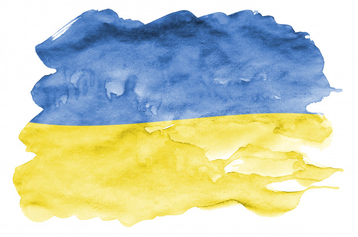 Twenty-three years ago, NATO bombs began falling across the territories of the former Yugoslavia, thus starting the war to halt the so-called “ethnic cleansing” occurring in Kosovo. It was the last war of the twentieth century. It led to one of the greatest humanitarian crises the world has seen, as roughly 600,000 Albanian Muslim refugees poured into neighboring countries. Two weeks ago, Russia invaded the sovereign nation of Ukraine, beginning another war and forcing hundreds of thousands of refugees to flee Ukraine into neighboring European countries. We are in the early stages of another significant humanitarian crisis. Undoubtedly, the war and the subsequent refugee crisis it birthed will impact what we, as The Matzevah Foundation plan to do this summer in Poland. The Jewish community of Poland and its many organizations and institutions with whom we partner are responding now to the most pressing needs of Jewish refugees fleeing Ukraine. Our Baptist friends and partners are opening their homes and churches to Ukrainian refugees. Other friends and partners are rendering aid at the border and elsewhere as refugees flood into Poland. We realize the tenuous nature of the emerging catastrophe and understand that our partners are acting as the first responders on the front line and we want to support their efforts. Consequently, we loosely hold whatever project plans we have in place or envision for the summer. We do not know what will happen next, so we are keeping all options open moving forward. We will reassess the situation in the latter part of April before making any decisions regarding our summer projects. Regardless of the current situation that we face in our work, our partners deal with tremendous change and challenges. Understanding the War’s Impact It is hard to imagine the far-reaching impact of war upon the lives of millions of people stricken by it. Generally, for most of us, it is too remote and abstract. But, then again, for us, as The Matzevah Foundation, it is even more challenging to comprehend when your friends and co-laborers are involved as they struggle to make sense of what is unfolding in Ukraine while responding to the war’s magnitude and devastation. Marla and Jay Osborn are two such friends and partners we have collaborated with since 2014 in numerous projects throughout Poland. In August 2018, we joined them along with multiple American and Ukrainian volunteers to restore the Jewish cemetery of Marla’s ancestral home in Rohatyn, Ukraine. Unfortunately, their work through the NGO they established, Rohatyn Jewish Heritage, is in limbo and may never be the same. Marla reports, “There is no Rohatyn work or project at this point - as long as the war rages, everything is on hold.” It is difficult for her to even share this news with us because she “cannot emotionally deal yet with [it].” Likewise, it is challenging for her to consider “reaching out for help in Rohatyn,” she writes, “while we are not there” because of “this war, and people, friends, supporters have bigger issues” with which they are contending. Marla and Jay stay abreast of the news coming out of Ukraine “very closely every morning, day, and night.” Also, they maintain contact with their “colleagues and friends in Ukraine.” She adds, “Thankfully, so far, everyone we know personally is safe, either in Ukraine or across the borders” in other European countries such as Poland. Despite this knowledge, she states, “[we] remain extremely concerned for all of them, and for, Ukraine, our home.” Marla and Jay were in California for a short trip before the war broke out. So, apart from the clothes they packed, she declares, “everything we own - tools, clothes, books, additional computers - is back in our Lviv [apartment].” Therefore, she says, “We are refugees now, in the real sense of the word.” The world they knew in Ukraine is gone, forever changed. Subsequently, Marla writes, “I do not know even what to do next.” Their priorities now, she writes, are finding a place to live along with determining “how to keep Rohatyn Jewish Heritage alive, how to support dear friends back home in Ukraine.” Addressing these issues for them “is overwhelming, sad, and destabilizing mentally and physically,” Marla concludes. In the end, Marla writes, “Ukraine will survive and re-build, the cost to lives and heritage and culture will be huge. I weep for all of this [situation].” Despite these realities, Marla sees the need for the Jewish diaspora to be connected and updated by the constantly changing circumstances in Ukraine. To this end, she is sharing information frequently on Facebook. For example, she shared a news report featuring “Sasha Nazar and other dear friends at the Lviv Volunteer Center who, despite difficult conditions including curfews and sirens,” continue their efforts “to restore the historic Jakob Glanzer synagogue.” Furthermore, she adds that this group is “also hosting dozens of Ukrainian families who have fled west due to the Russian War” along with “preparing barricades that can be erected on the city streets if necessary.” Likewise, she shares on Rohatyn Jewish Heritage’s Facebook page news from their friends in Rohatyn, where “friends, students, and volunteers” took time during the day recently to sew “camouflage netting” and prepare “meals for defenders in bigger Ukrainian cities.” Finally, she provides information concerning avenues to support the ongoing war financially and humanitarian relief efforts as the crisis unfolds. Moving Forward Like all of you, we will continue to monitor and discern the daily news. TMF is committed to standing with the people of Ukraine and that will play out in how we offer support, encouragement, and a listening ear to our friends in Eastern Europe. Please stay in touch with us through social media as to any further actions we may take in the coming days and weeks. We also encourage you to follow some of our partners on social media. They are sharing about the work they are doing to render aid to refugees as well as sharing resources that are available to those who are arriving in Poland and for those remaining in Ukraine. These are trusted sources and we are inspired by their faithfulness and actions. Rohatyn Jewish Heritage- FB and web Foundation for the Preservation of Jewish Heritage in Poland - FB and web MDSM / IJBS International Youth Meeting Center in Oświęcim - FB and web Jewish Community of Warsaw- FB and web Baptist Christian Church, Warsaw- FB and web We join you all in prayer that these dark days for our world will come to a peace resolution quickly. May God bless the Ukrainian people around the world. - Dr. Steven D. Reece, President of The Matzevah Foundation Applications are now being accepted for the second JewishGen Future Scholars Fellowship Program. The dates for this immersive trip to Poland are July 5-14, 2022. The Matzevah Foundation is happy to partner once again with this unique experience. The purpose of this program is to inspire and begin the training of the future generation of leaders in Jewish genealogical involvement. Focusing on Poland, we seek to explore basic tools of genealogical searching in Poland, once home to more than half of world Jewry, and share and protect the history that gave shape to that genealogy of the past and future.
To learn more about the program, visit the JewishGen website. Another year is about to come to an end-- a year that once again didn't see us in Poland. While it was heartbreaking to not conduct our annual cemetery restoration projects, we continued to pivot and find ways to stay engaged in the work and support our partners in Poland. We thought we'd share some of highlights from 2021 with you! Education and AwarenessWe spent a lot of our time and energy in sharing news and resources about a variety of topics. Through social media posts, blog content, and discussions, we conveyed facts and memories about the Shoah (or Holocaust), the importance of remembering, and educating followers about the great Jewish cemetery work that's being conducted around Europe. Check out some of these blog posts: Books on the Holocaust Movies and Documentaries on the Holocaust The Importance of Holocaust Education Map of TMF's Cemetery Restorations Projects New TMF VideoOne of our biggest projects for 2021 was the creation of a video that we premiered in late November. Entitled, Matzevah: A Stone Upon Which Lives are Written, viewers get an in-depth look at the heartbeat of The Matzevah Foundation. Community EngagementTMF had the pleasure of joining in unique community events, both an international community and a few local communities! In April, TMF President Steven Reece joined a virtual meeting of the Seaside Jewish Community in Rehoboth Beach, Delaware. The group was highly engaged in his presentation of our work and the history of caring for Jewish cemeteries in Poland. It was a privilege to hear about some of the member's Polish Jewish roots. In July, TMF was a sponsor of a worldwide virtual conference entitled Restoring Jewish Cemeteries in Poland 2021: The Task Ahead. The event was well attended by people all around the world who are either actively engaged in restoration work or have interest in getting started. You can view this exceptional conference on our website here. In September, members of TMF's board who live in Nashville, TN participated in the annual Sukkot art exhibit at the Gordon Jewish Community Center. The JCC invited us to submit an art piece for their exhibit called, Hope and Renewal. Our piece utilized paint and photographs to show the transformation of a Jewish cemetery during a week of work. We were honored to be invited to this special Nashville community event! Board MeetingsThe board of The Matzevah Foundation met both in person and on Zoom several times this year. A highlight was our annual getaway to the mountains, this year in Townsend, Tennessee. We gathered for four days of fellowship, planning, and dreaming for our 2022 work. We unanimously voted to take a step in faith and make plans for a return to Poland in the summer 2022! We began to lay out possible locations and dates for cemetery work. We're spending the winter months fine tuning our projects and hope to announce those to everyone by early spring. We continue to monitor the state of the COVID-19 virus as well as health and travel precautions for Poland, the US, and countries where volunteers live. FundraisingTMF continues to be blessed by the financial giving of so many in 2021. We know that many friends and family are experiencing hard times caused by job loss, illness, and other challenges so we do not take these gifts lightly. Your giving has allowed us to support several of our partners in Poland who were able to carry out commemoration and restoration projects this year. It also helps us to know we have a good start on the financial resources we'll need to return to Poland ourselves next summer. We can't do this without you! If you'd like to make a year end contribution, please visit our website for an easy and fast way to give. Thank YouThank you to all of our friends, followers, and donors for helping us to have a great 2021! We can't wait to share with you soon all that we have planned for 2022.
Blessings to you and your families this holiday season and in the new year ahead! The Matzevah Foundation was honored to be a part of the 2021 Under One Roof Art Exhibit for Sukkot at the Gordon Jewish Community Center in Nashville. This year's theme was "Hope and Renewal." TMF's piece focused on the transformation of a cemetery during our work. We highlighted the Jewish Cemetery in Oswiecim. The top of the piece reflects the darkness that we face when walking into a cemetery on the first day. It's covered in tall grass, trees, and shrubbery. The middle portion highlights how the transformation is achieved. Little by little, with the work of many hands, the cemetery is returned to the light by the removal of overgrowth. The bottom section celebrates the final result with clear paths and clean line of sight to the beautiful matzevah (headstones). We can now see the names and remember the lives.
Our projects are a celebration of hope and renewal as people from around the world work together to remember lives lost and to learn from history's past mistakes so we do not make them today. Here are some pictures from the exhibition! |
© The Matzevah Foundation, Inc. All rights reserved.

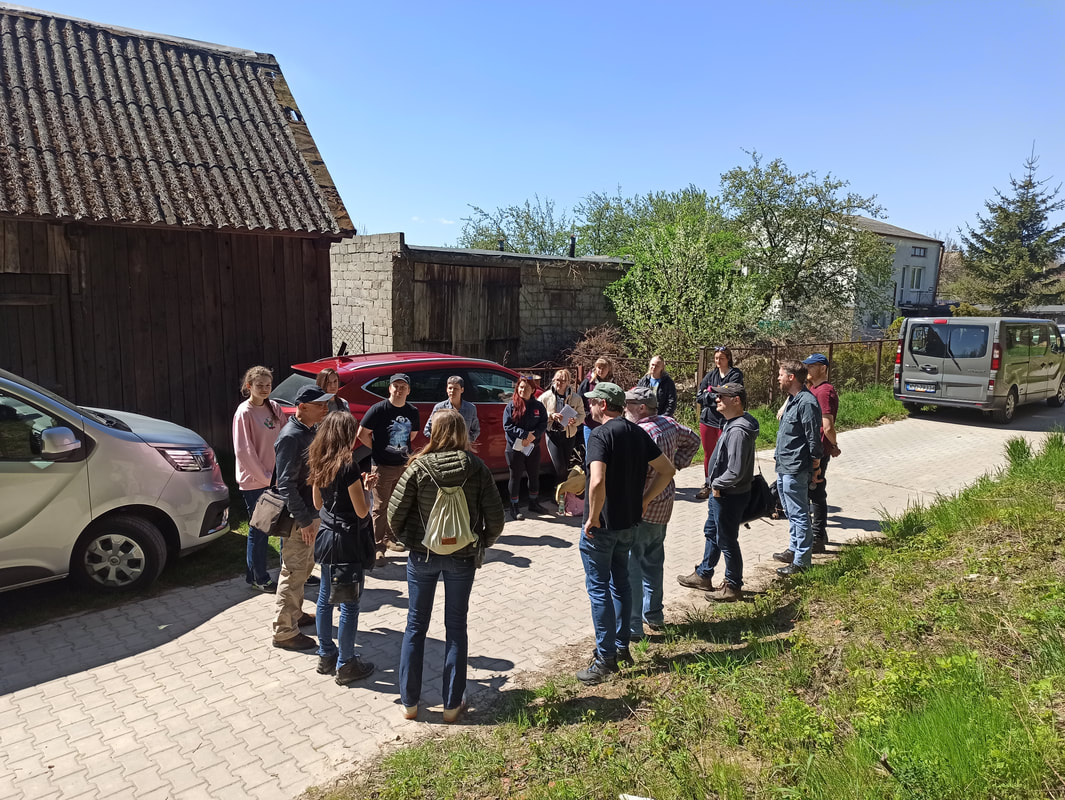
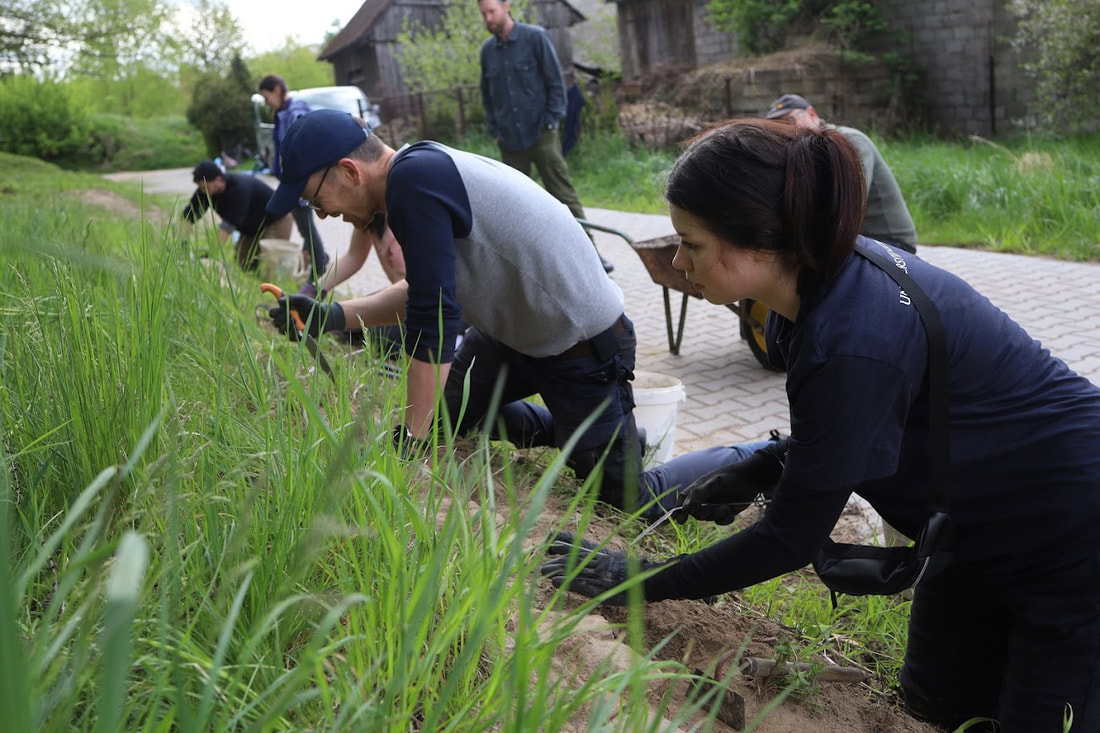
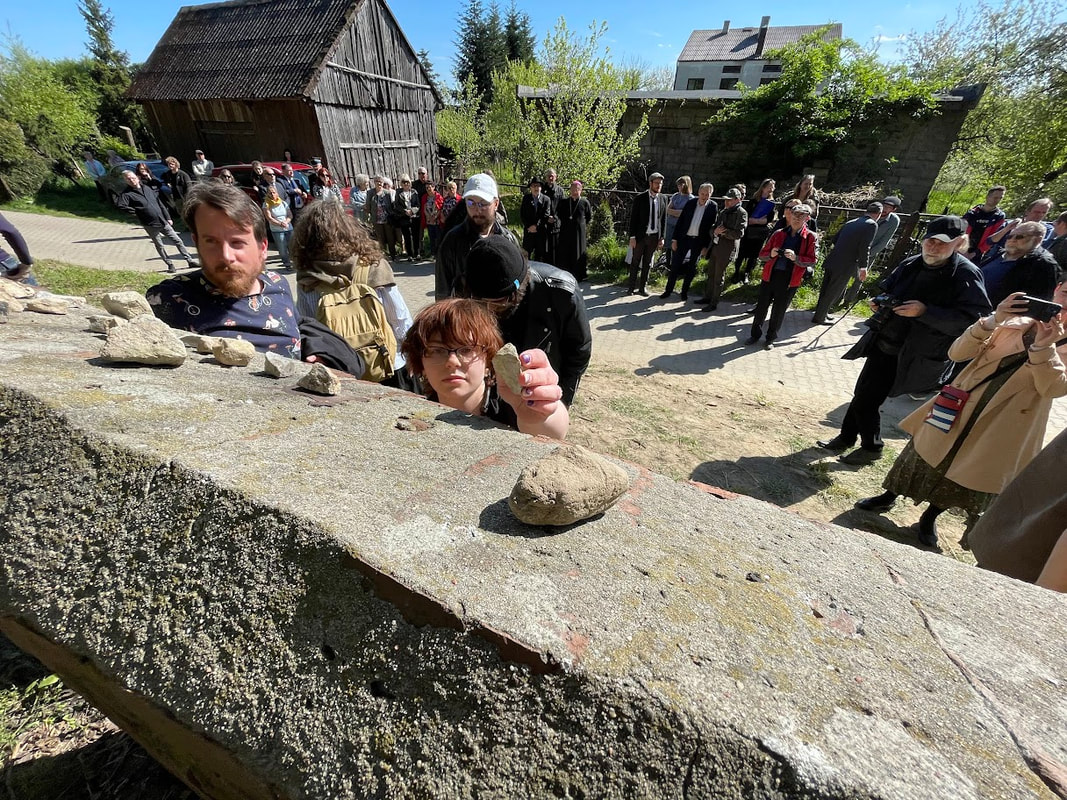
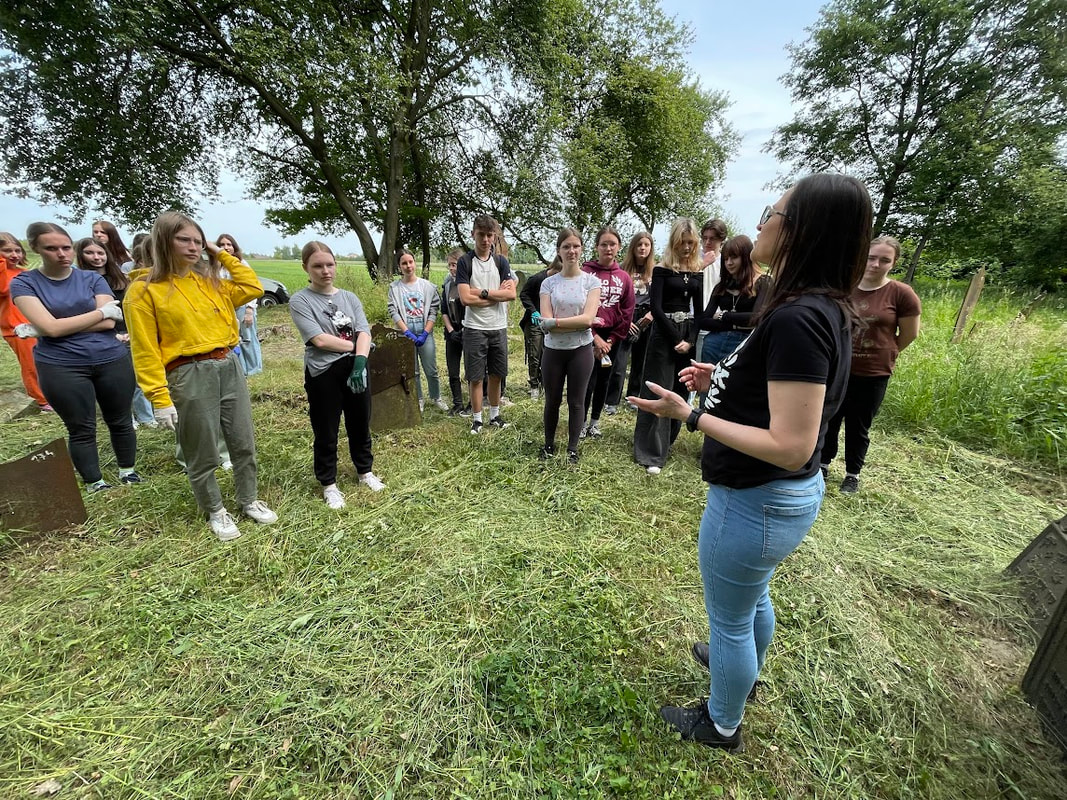
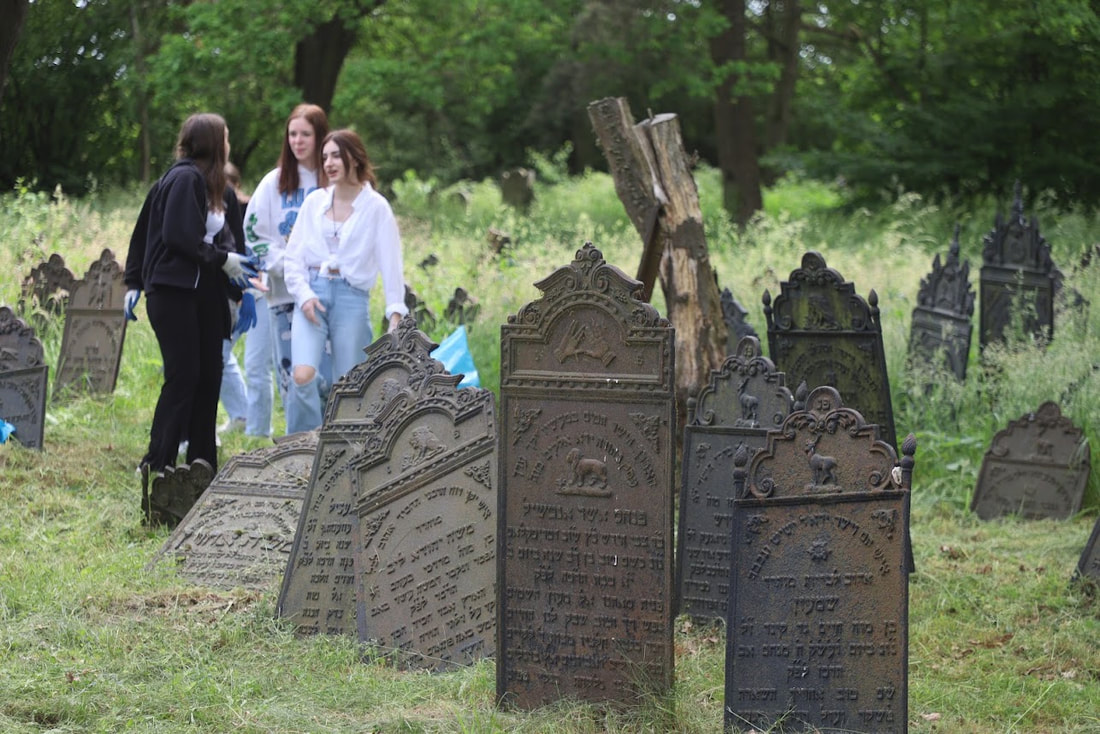
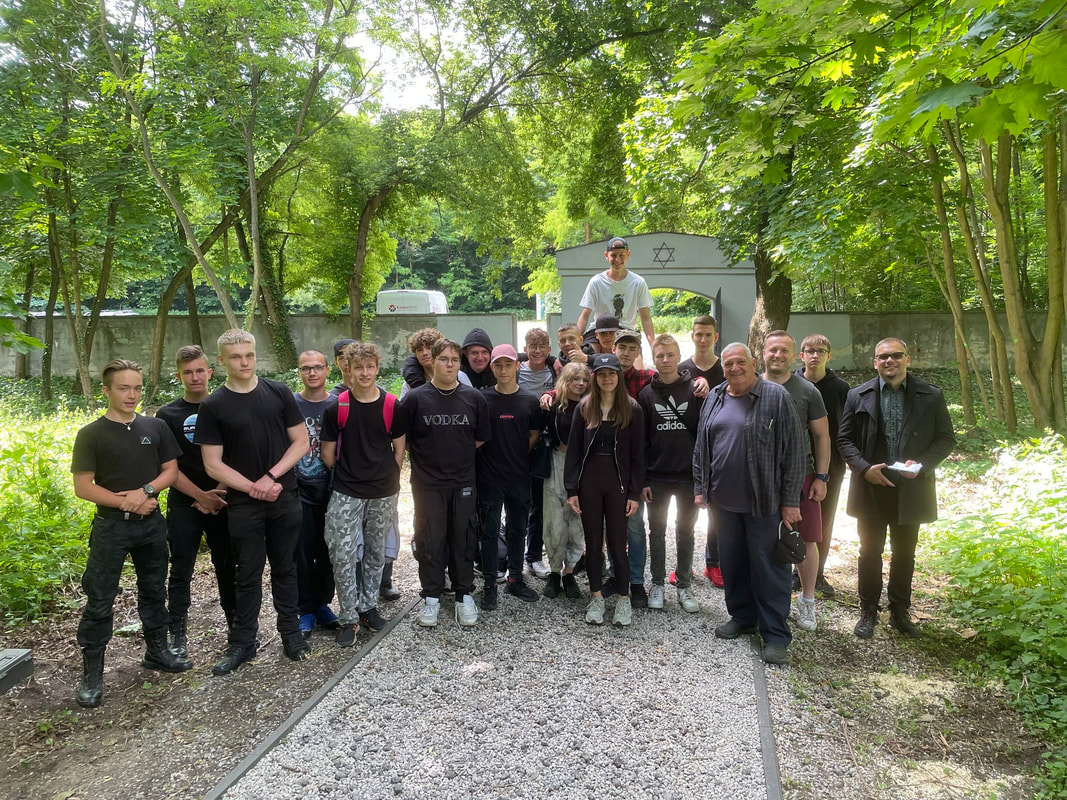
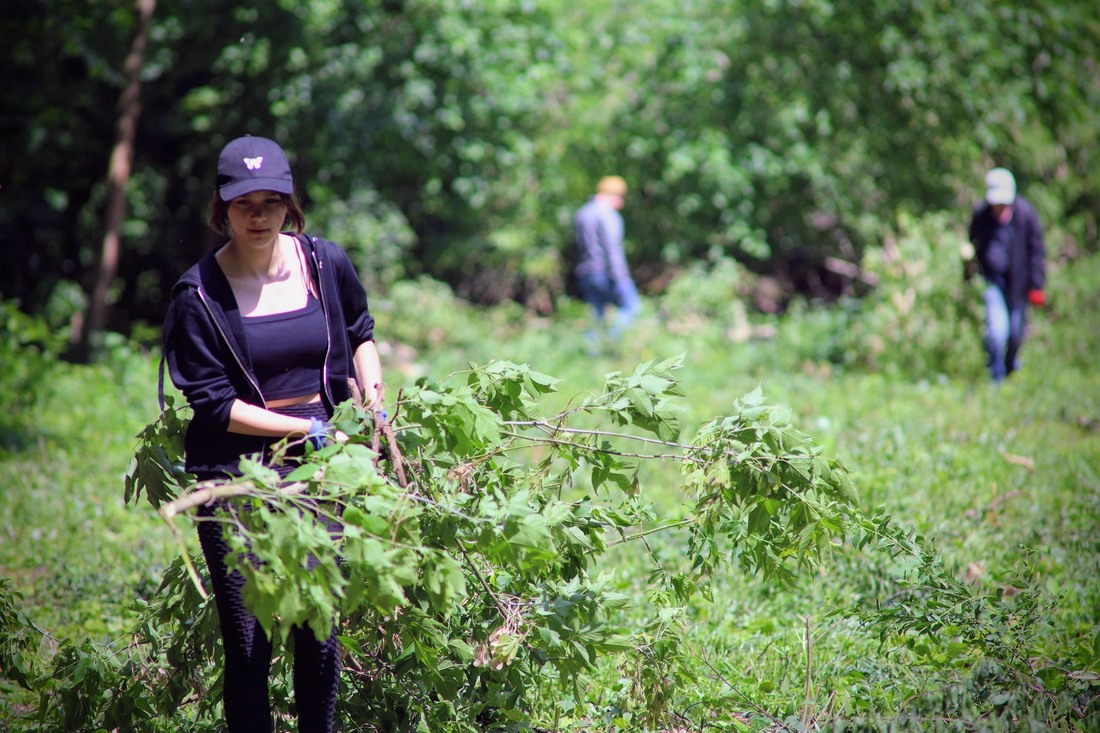
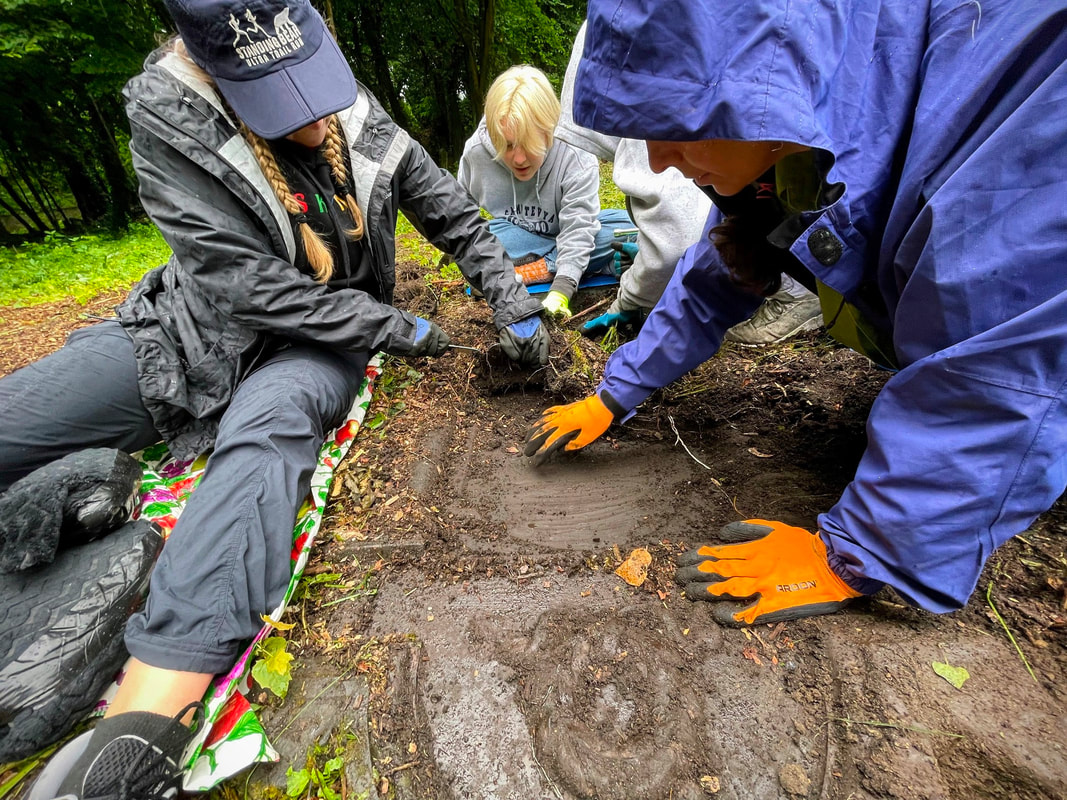
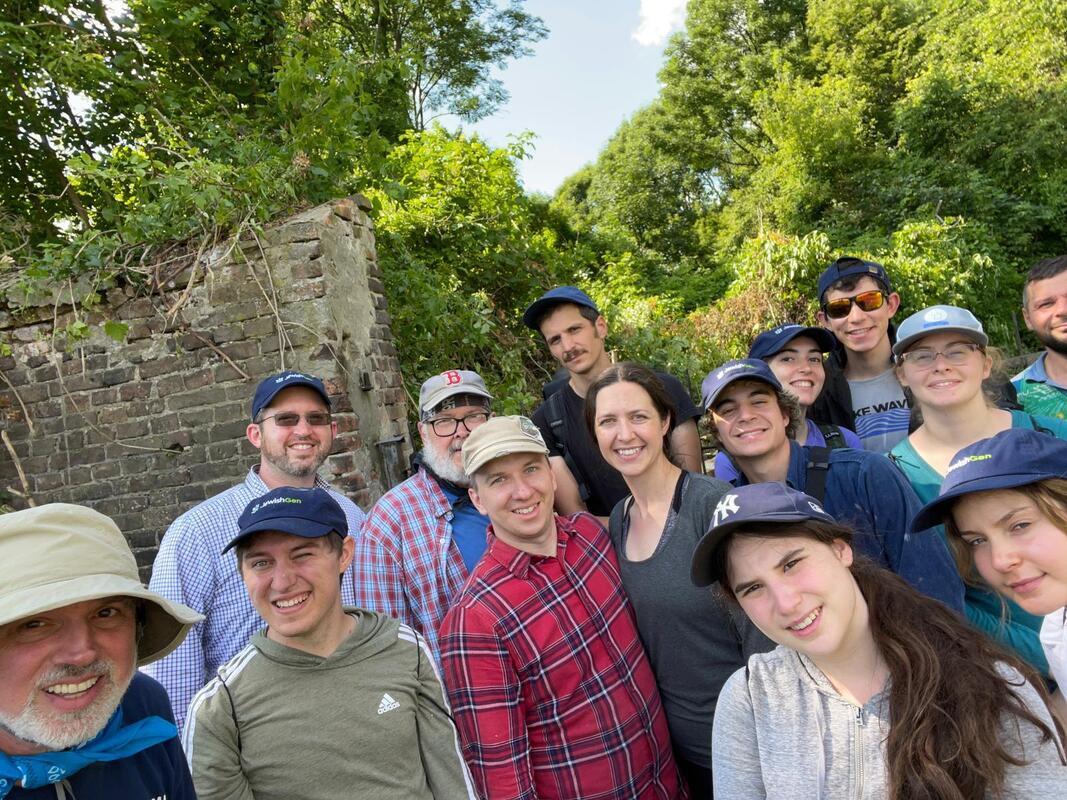
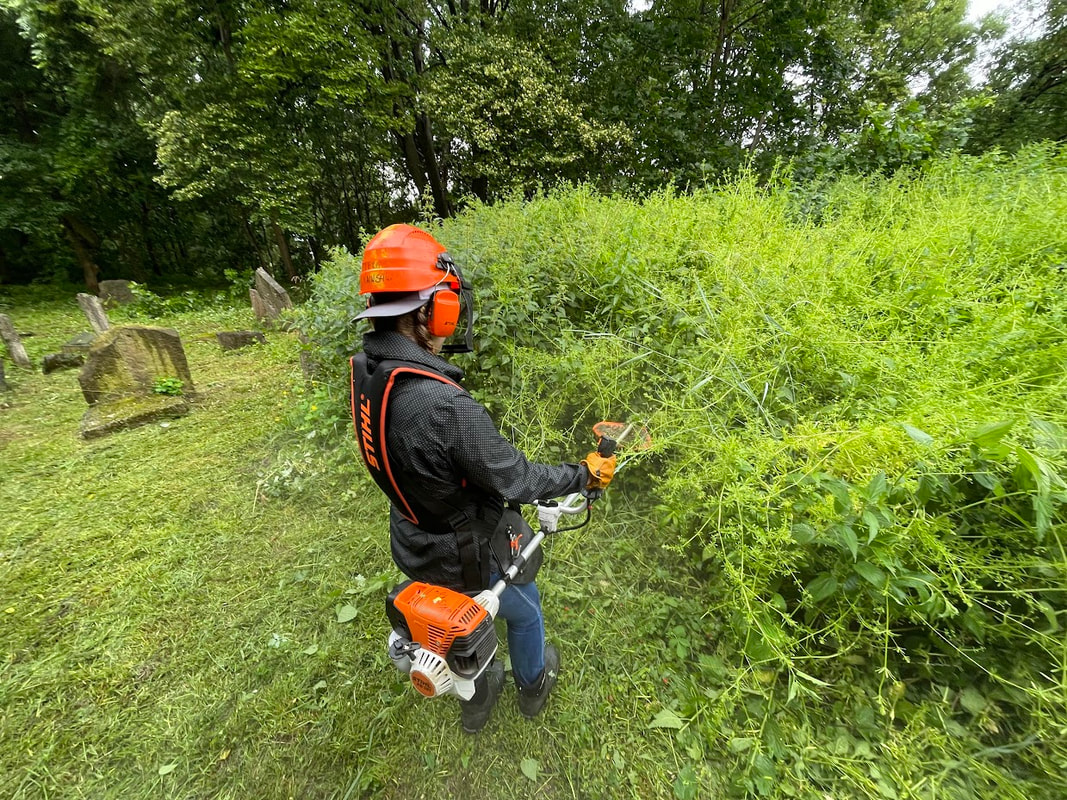
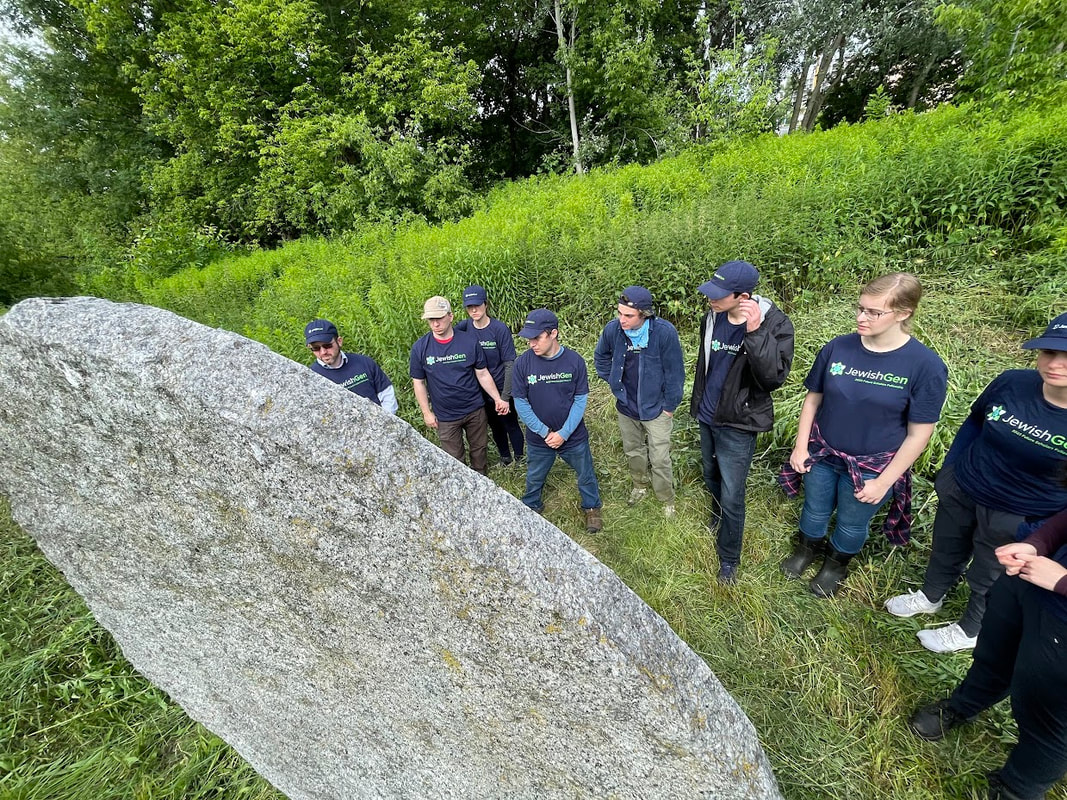
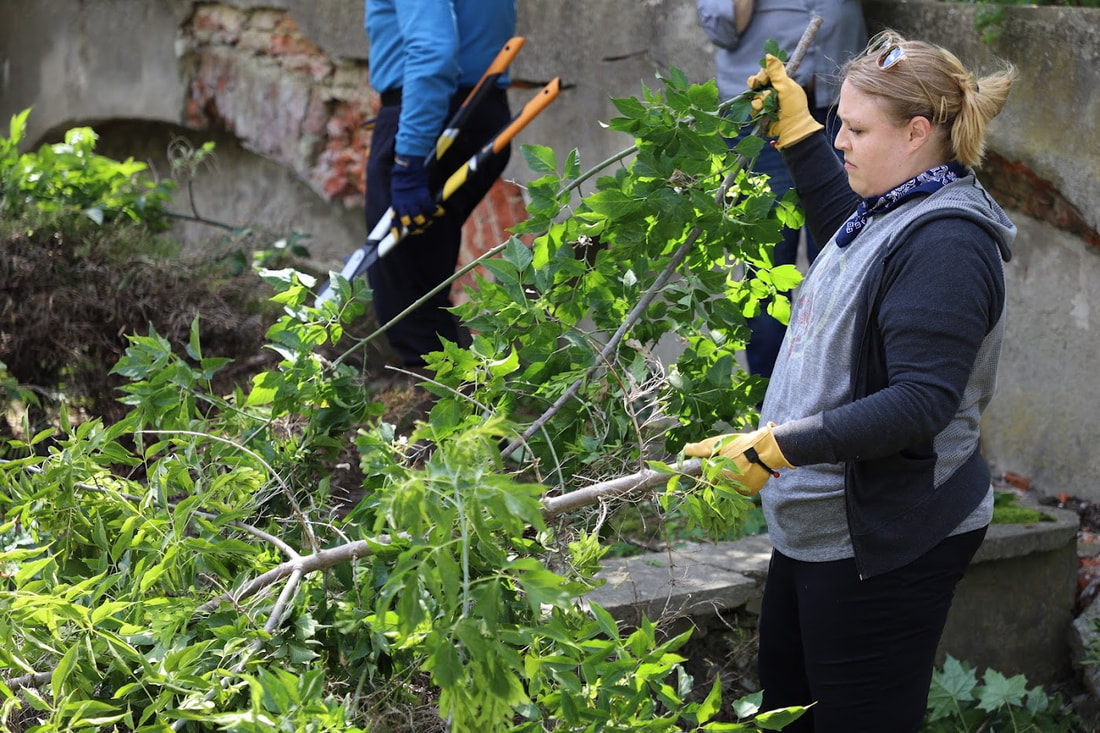
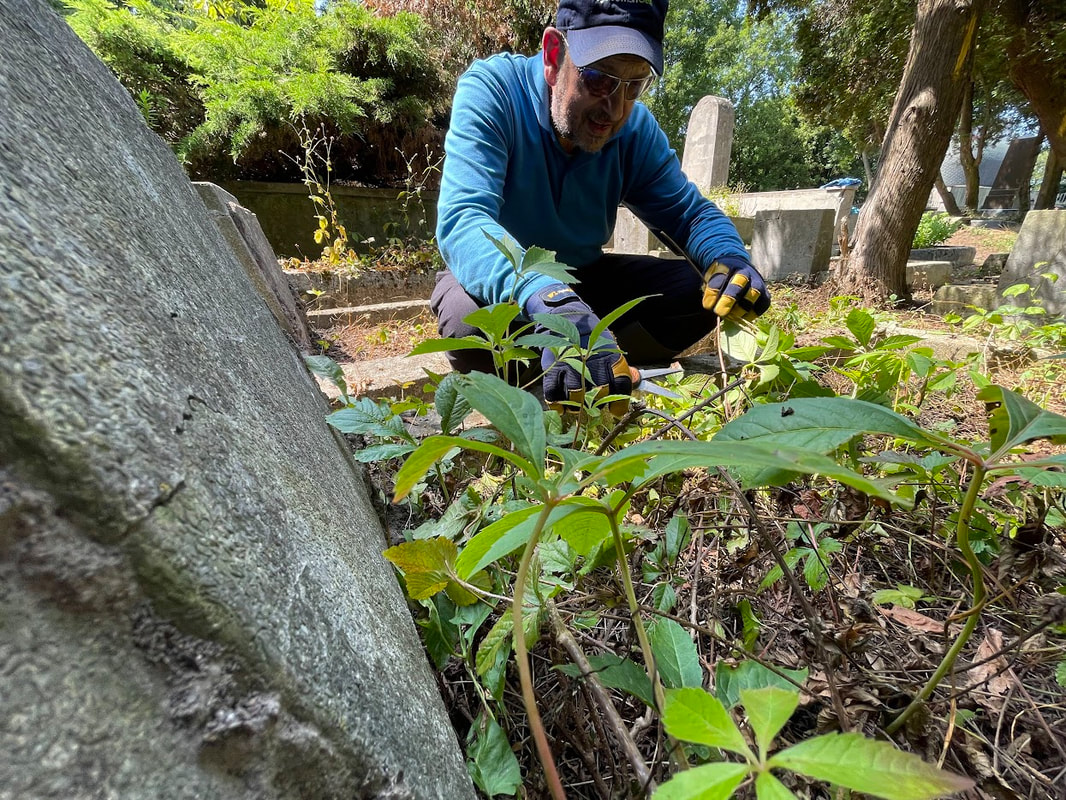
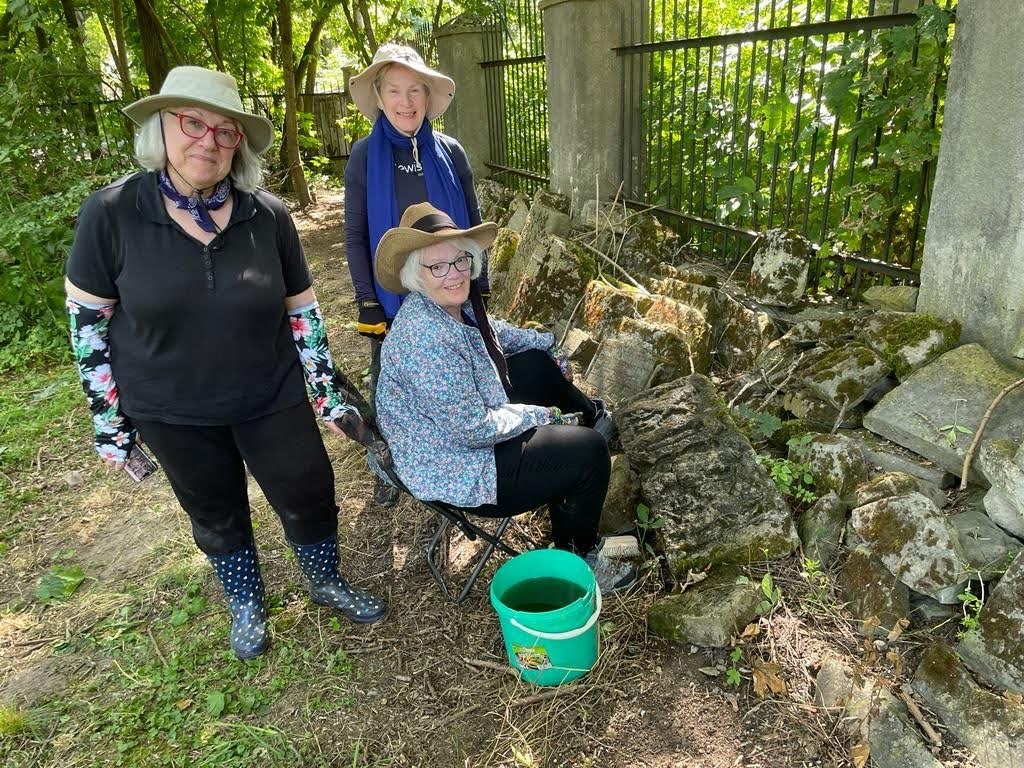
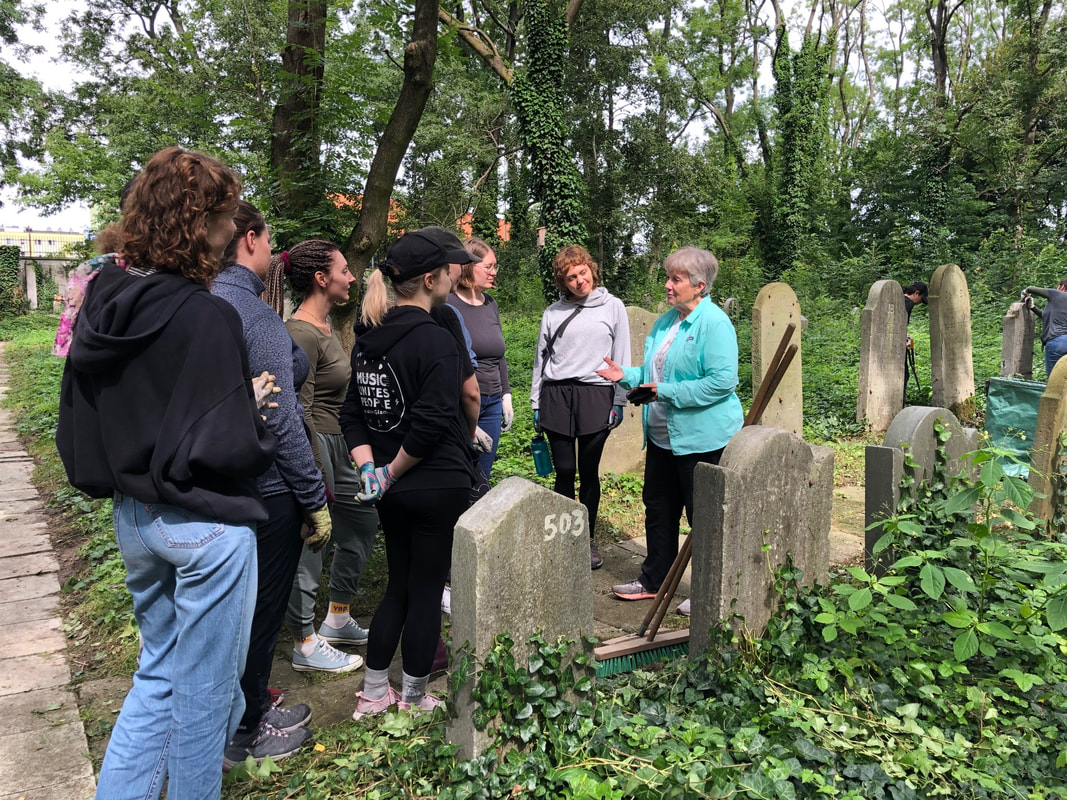
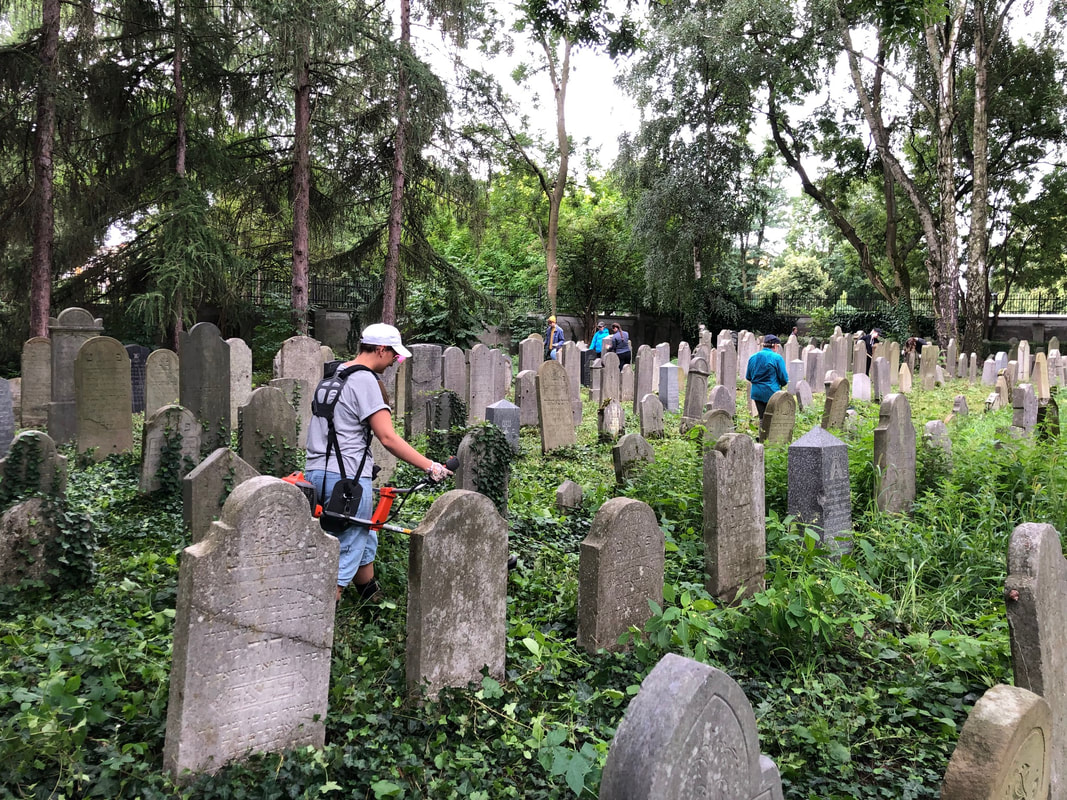
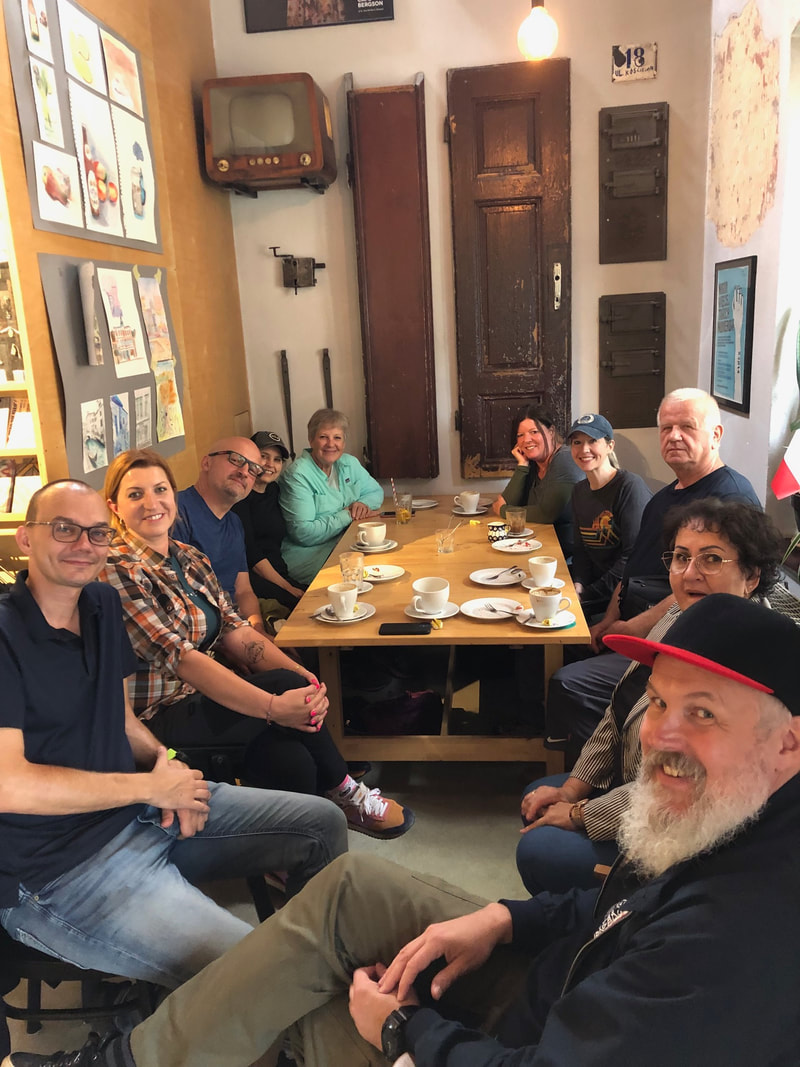
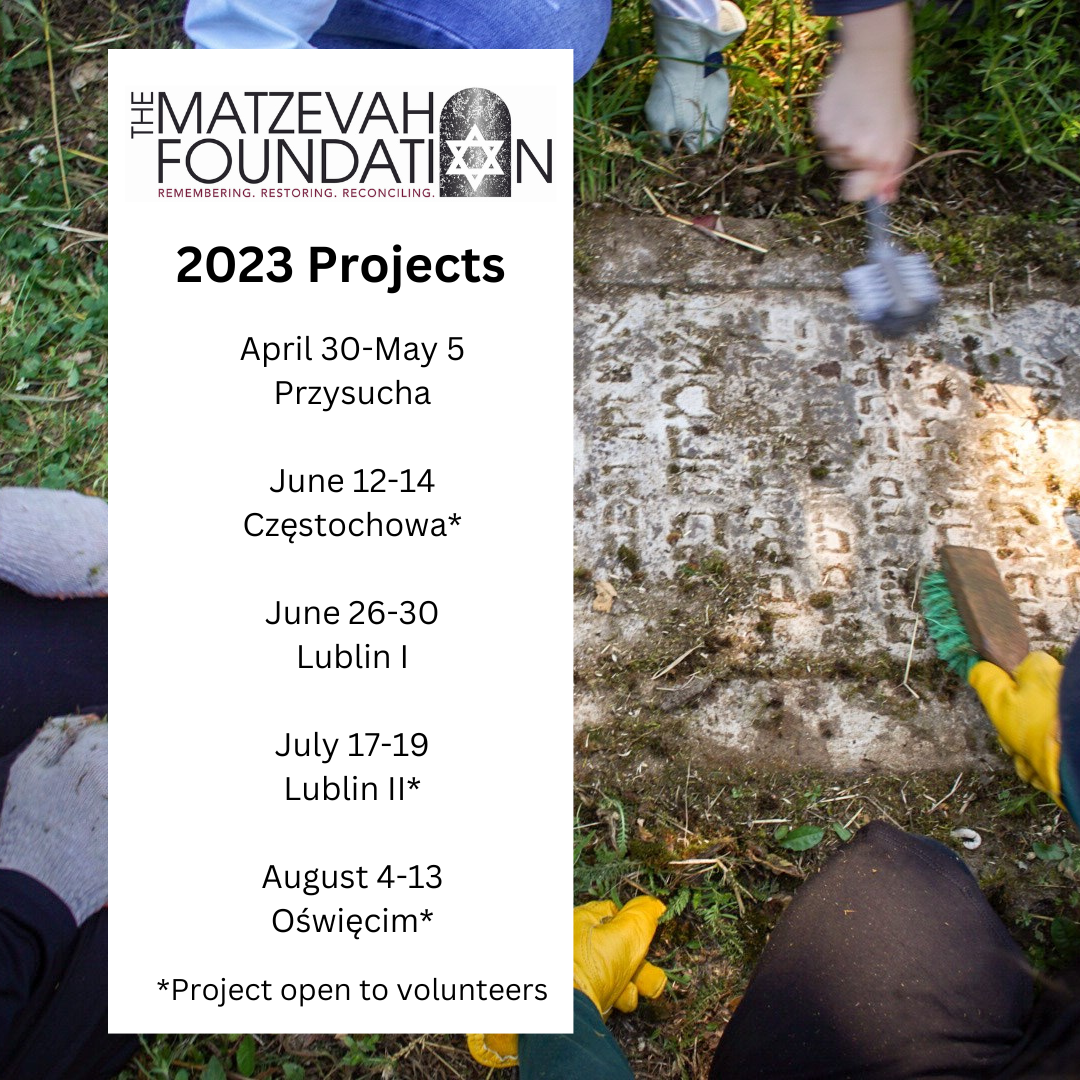
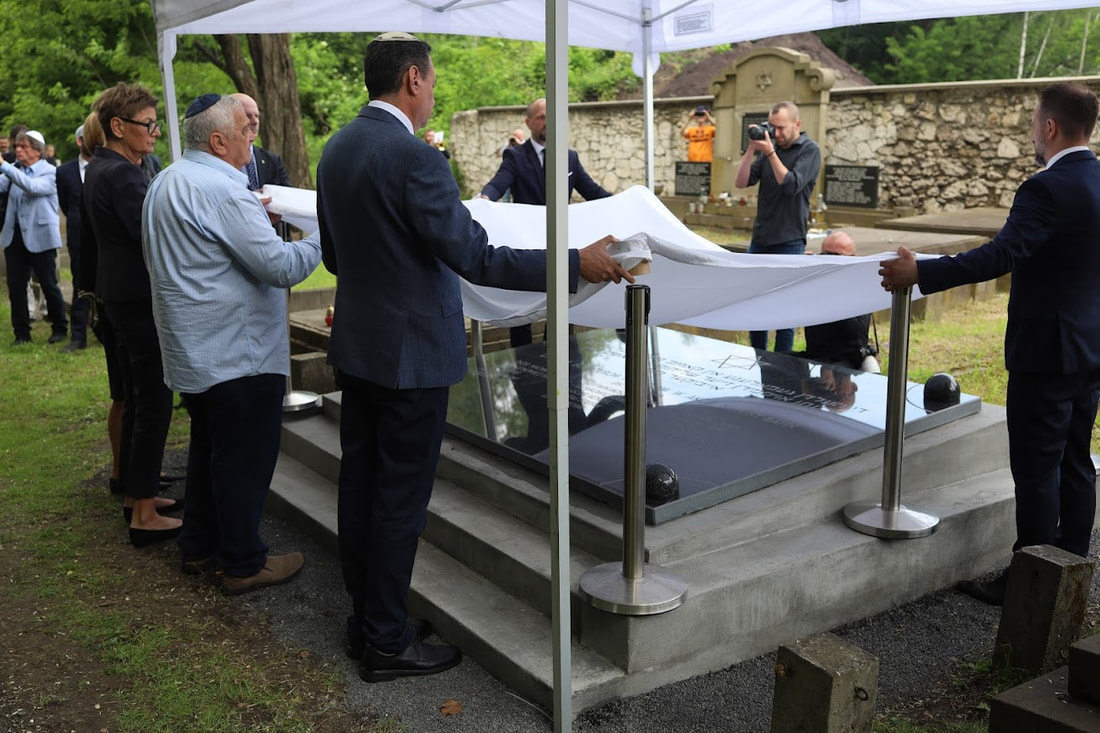
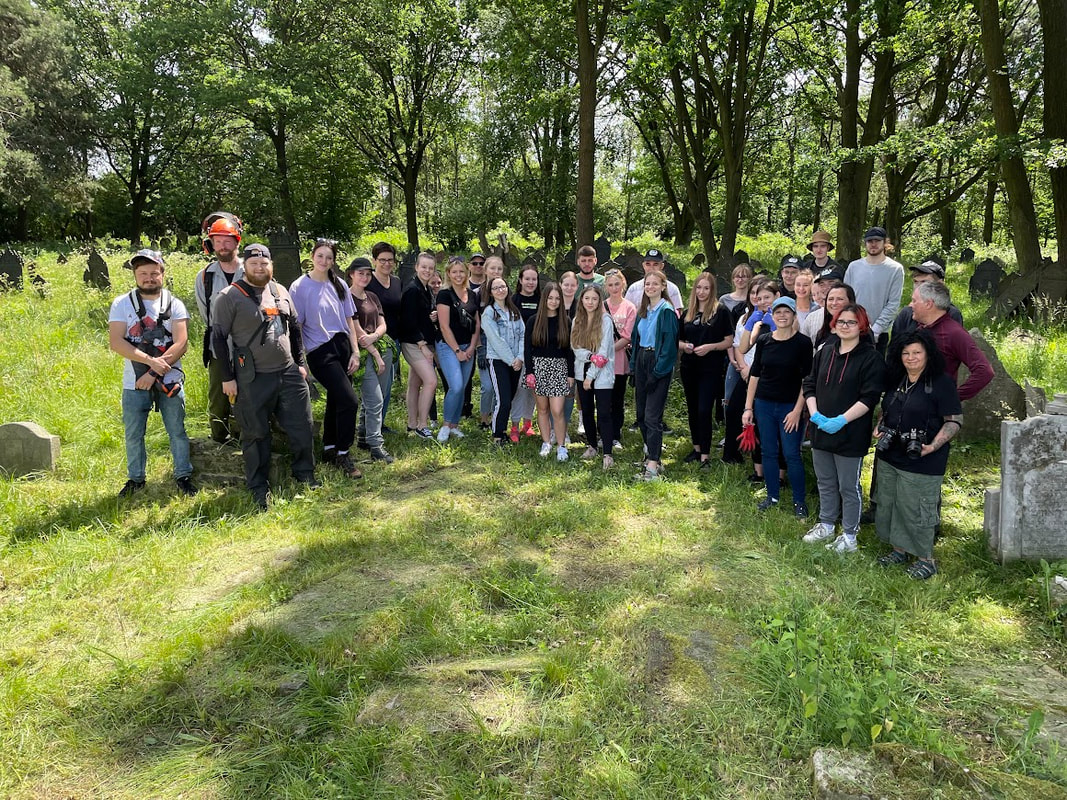
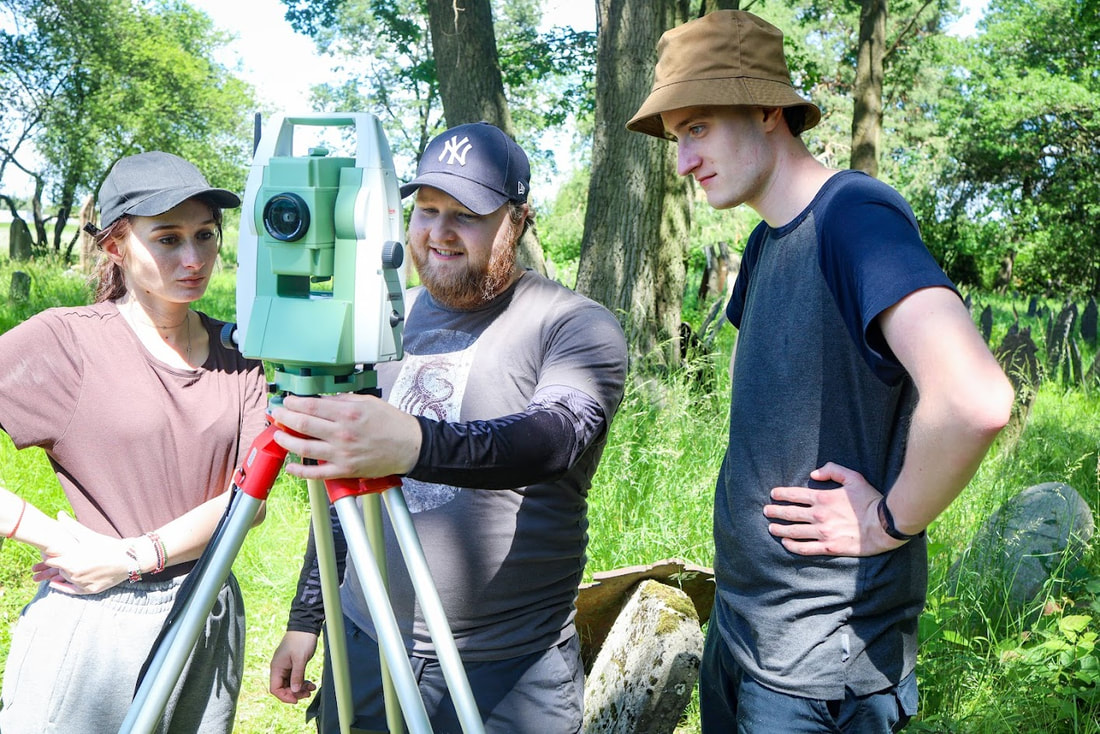
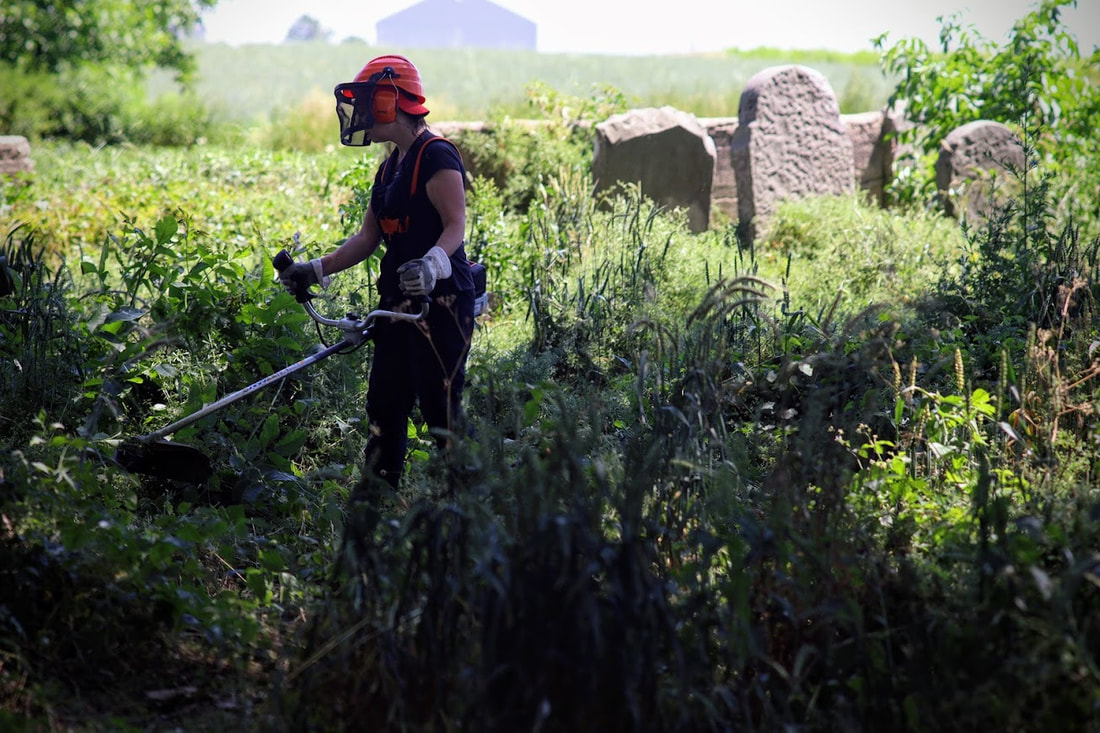
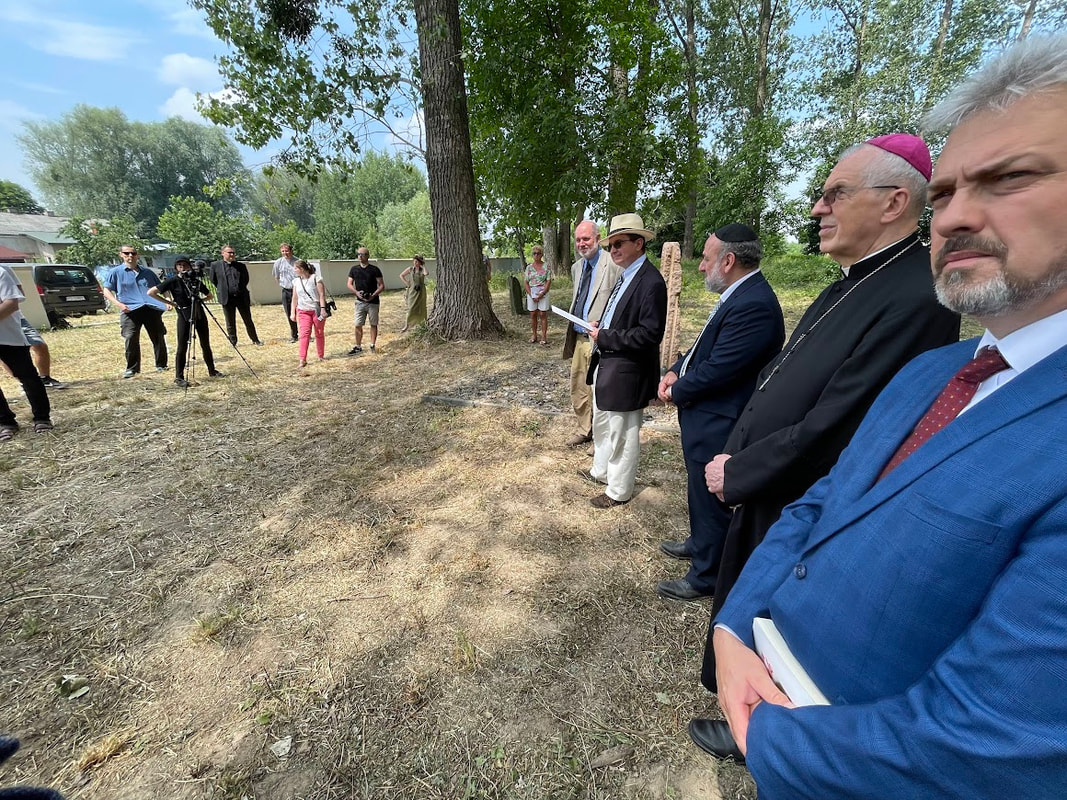
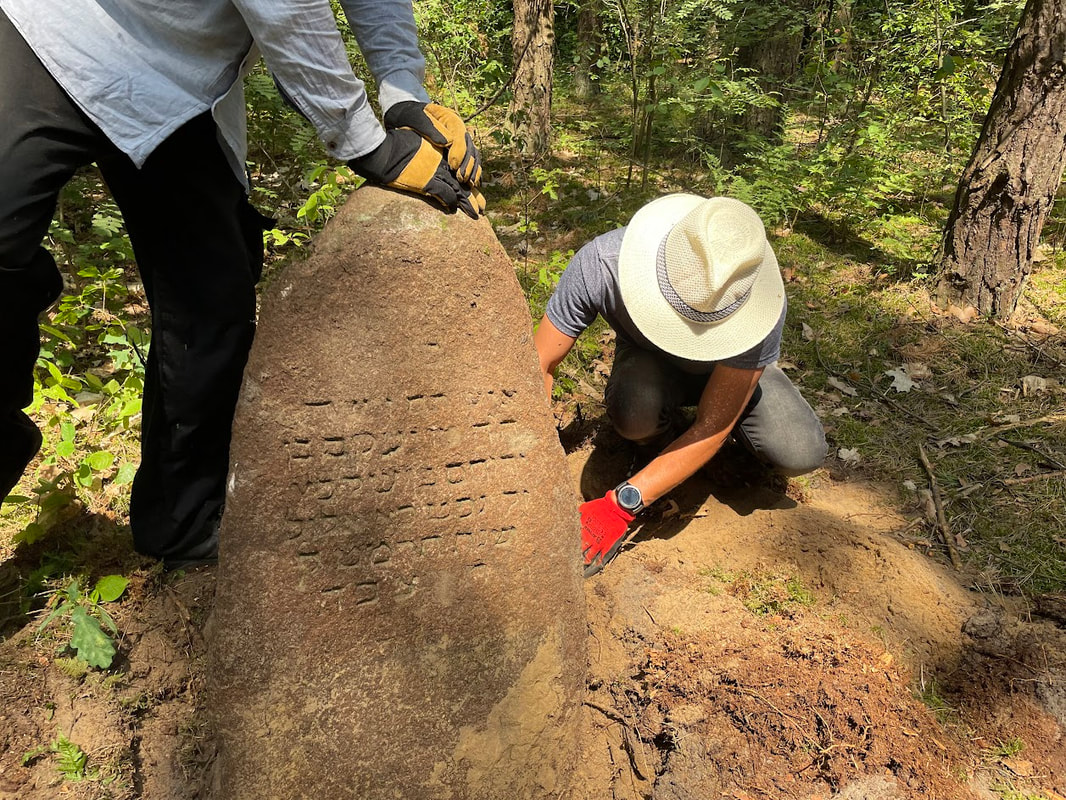
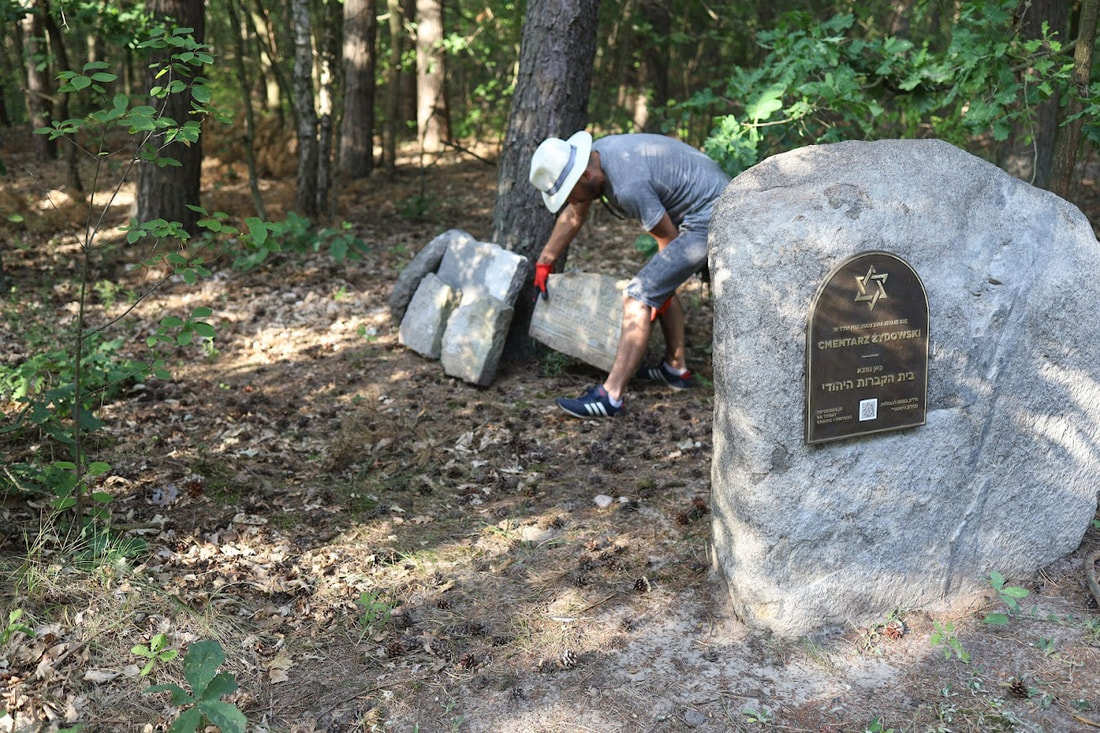
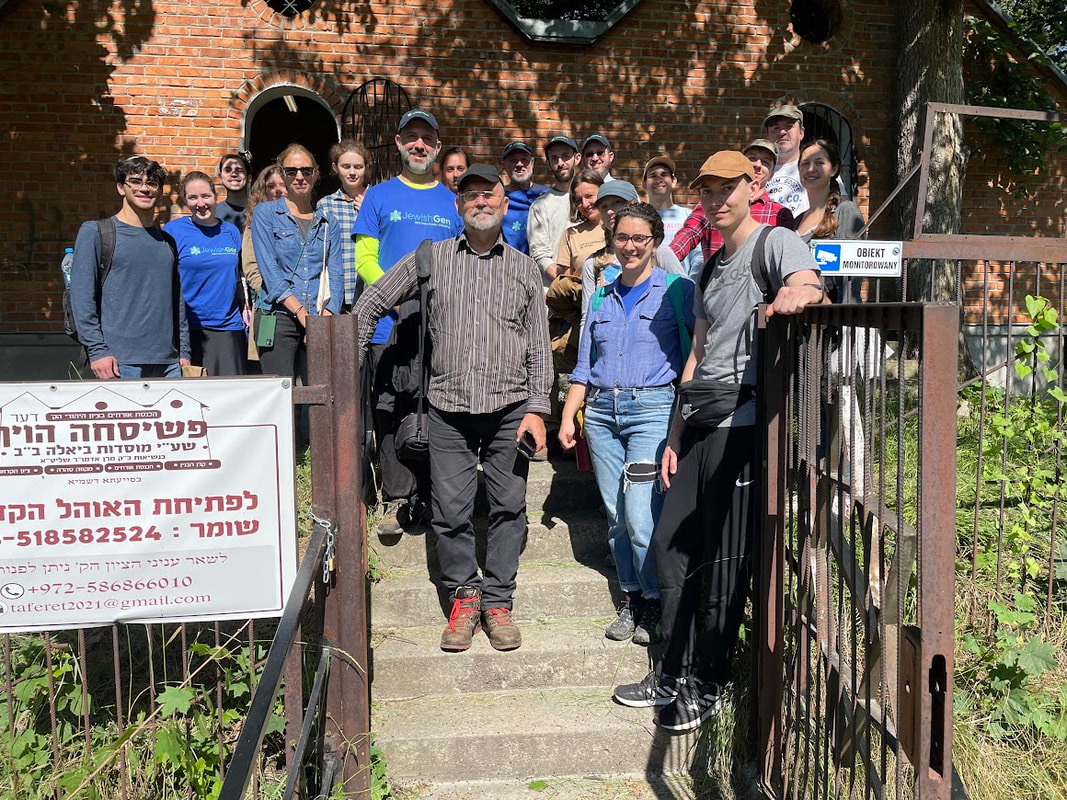
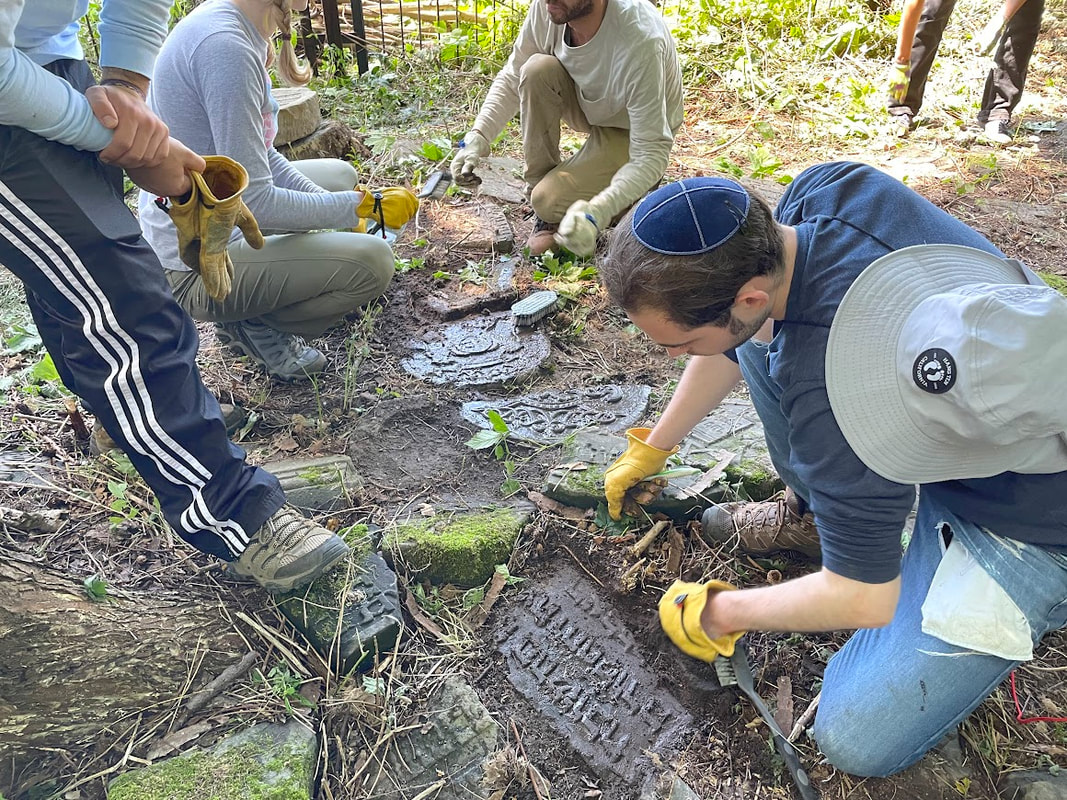
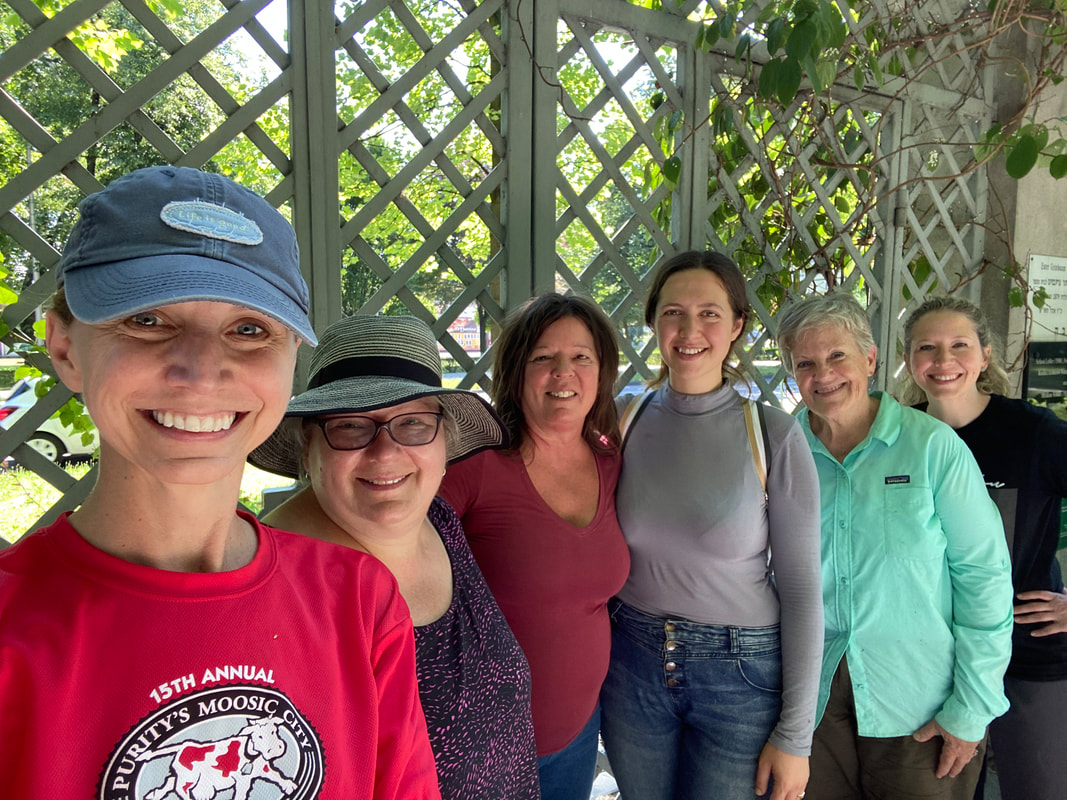
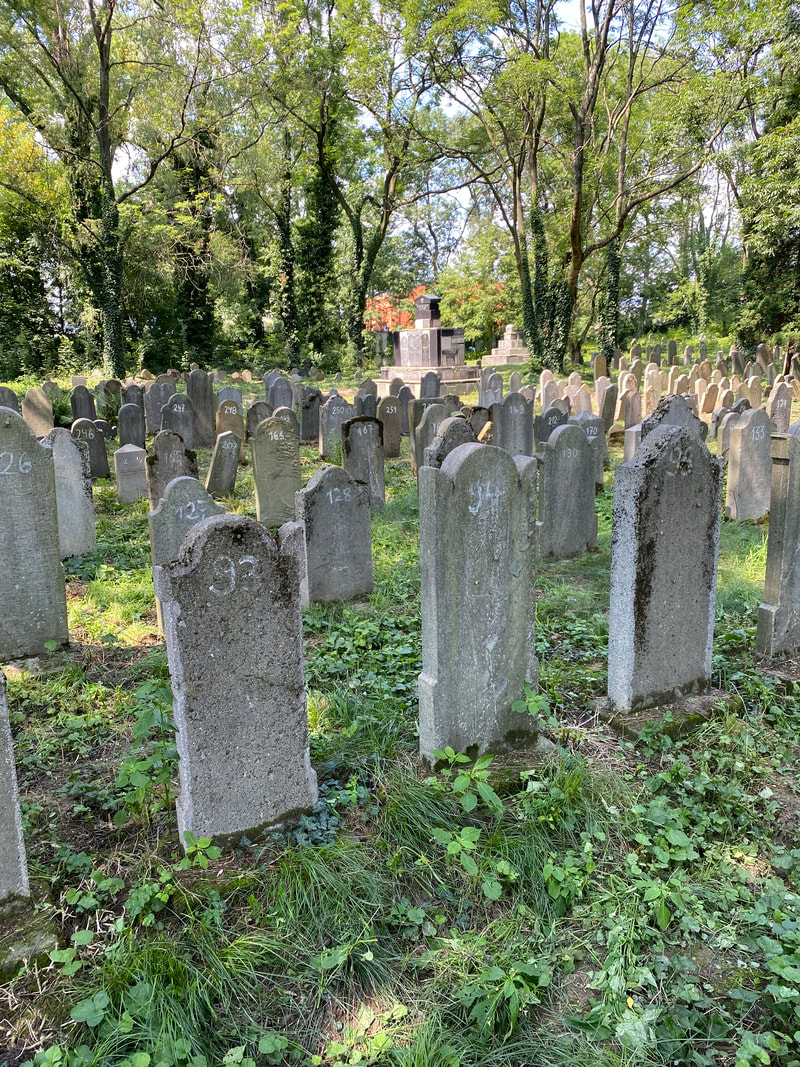
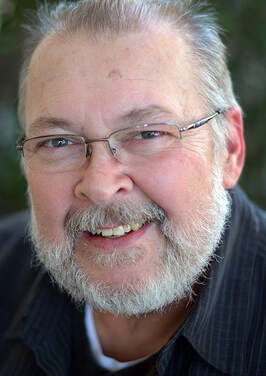
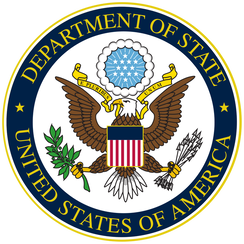

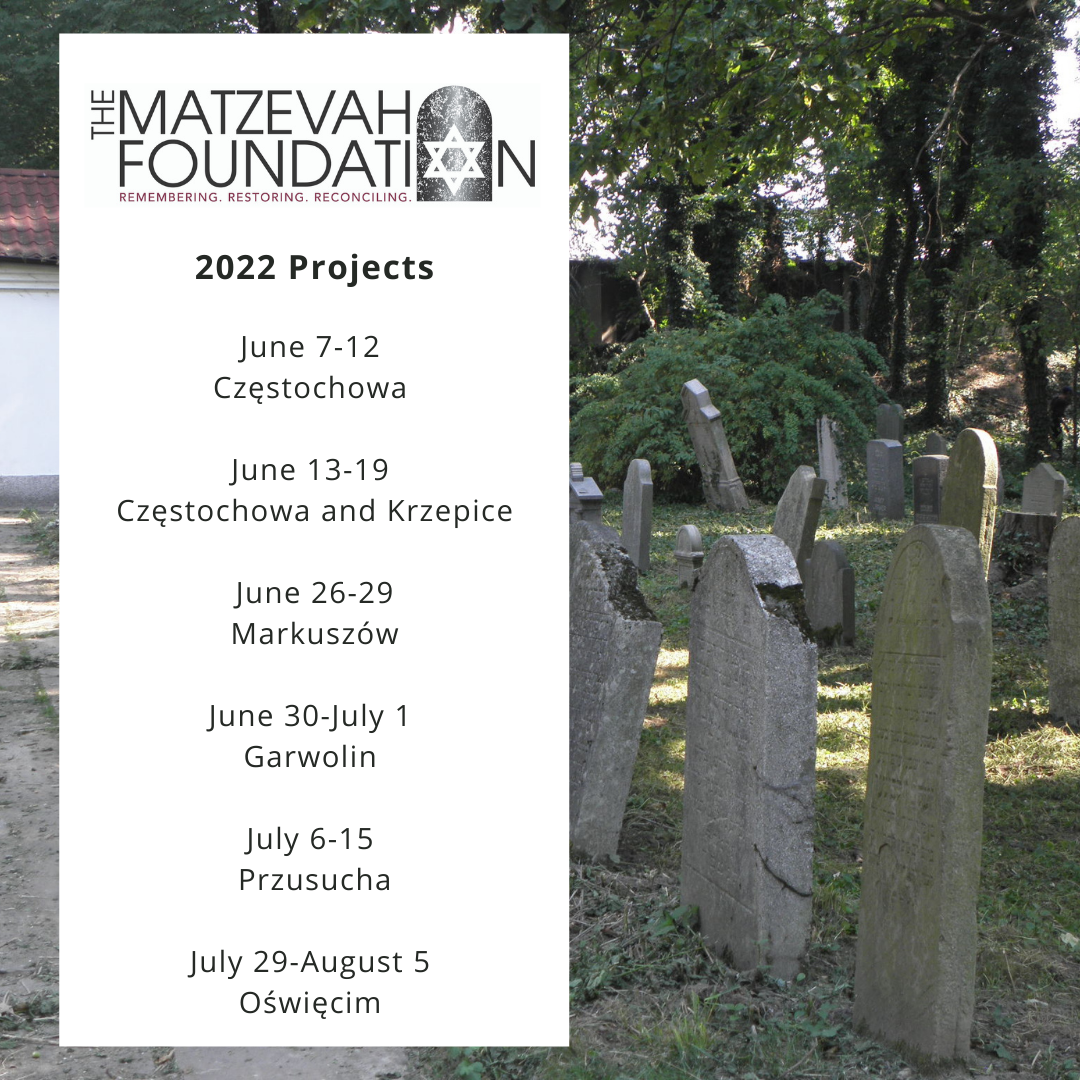
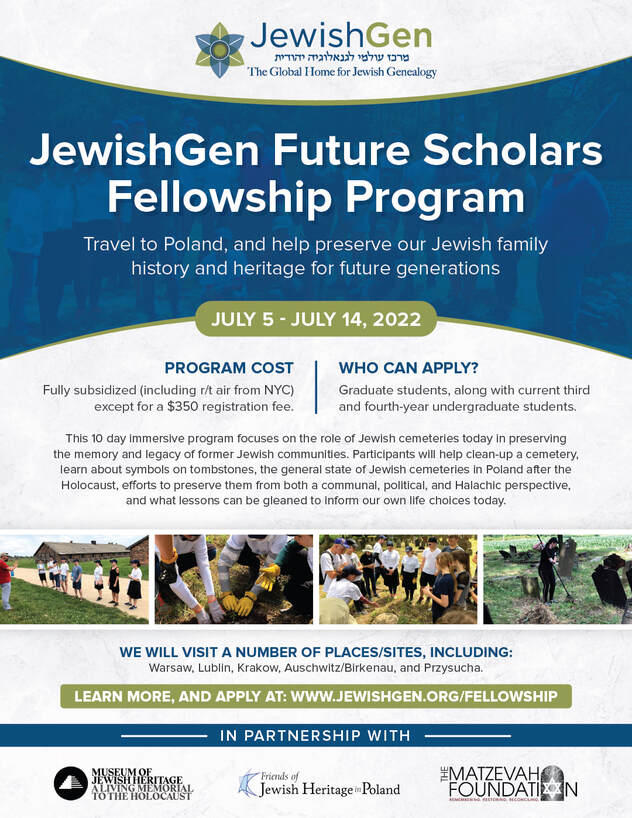

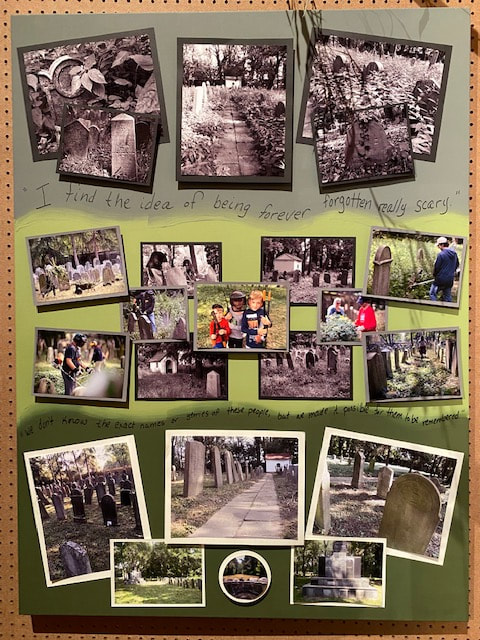
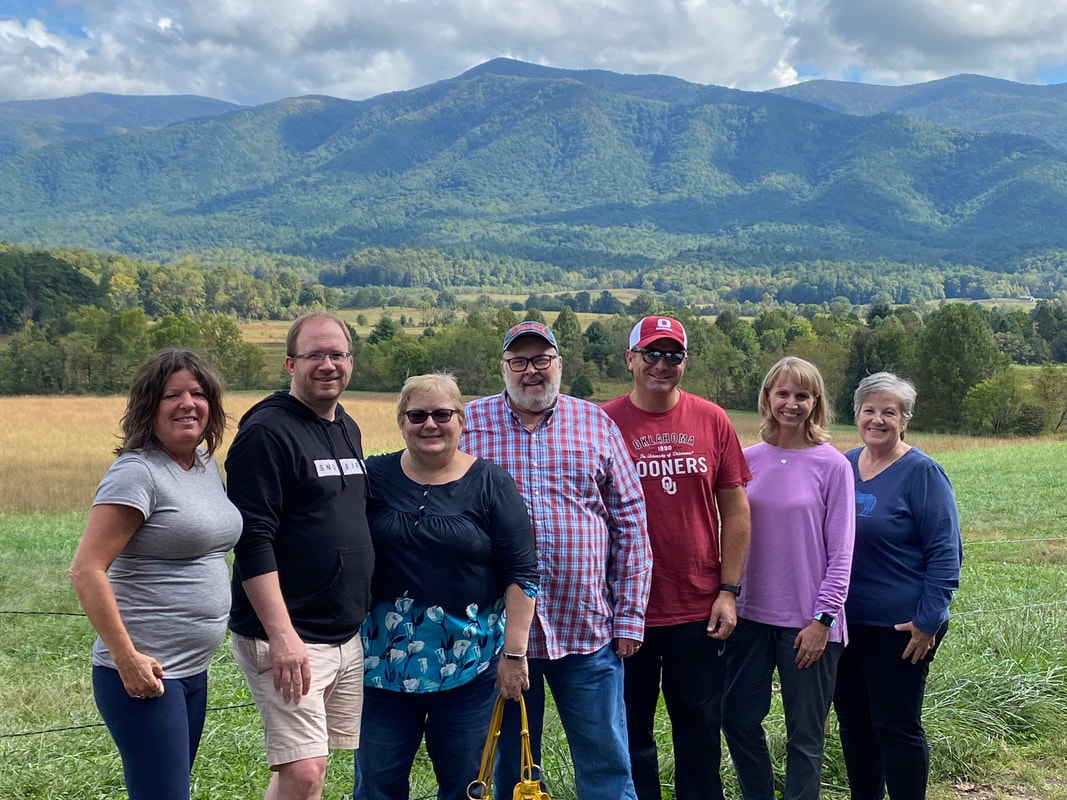

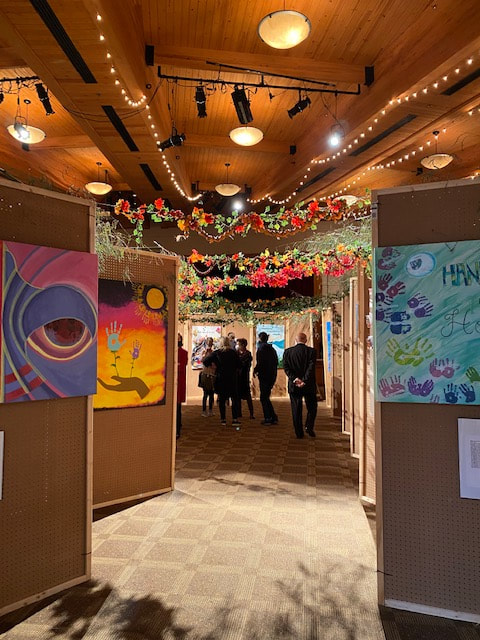
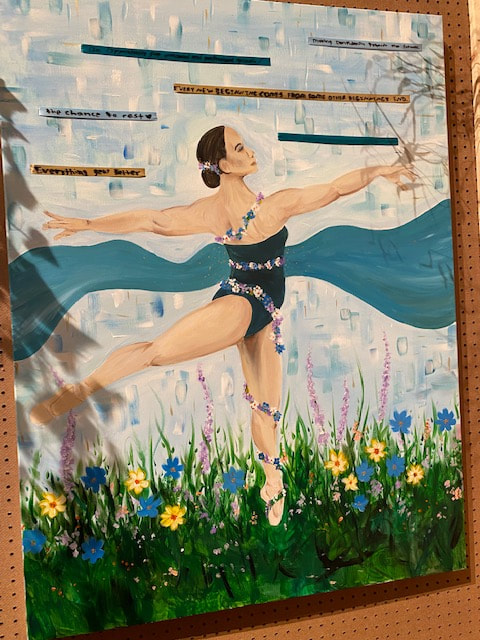
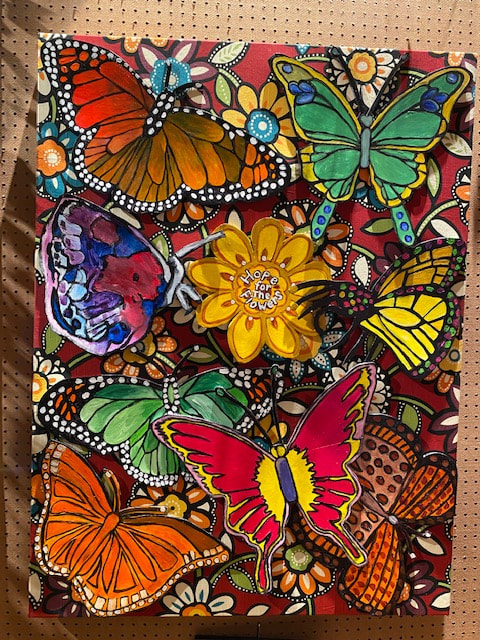
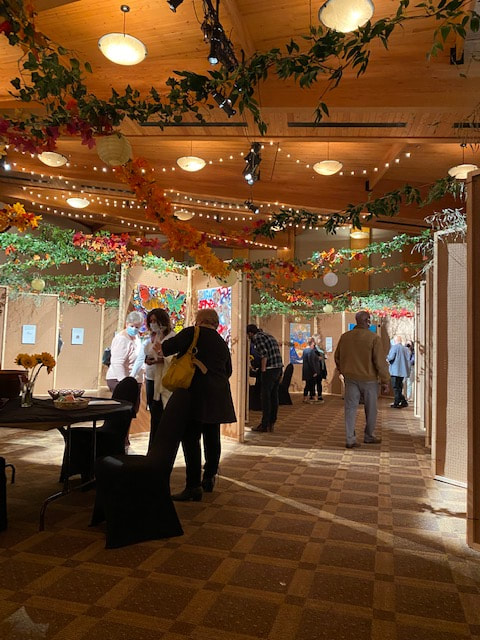
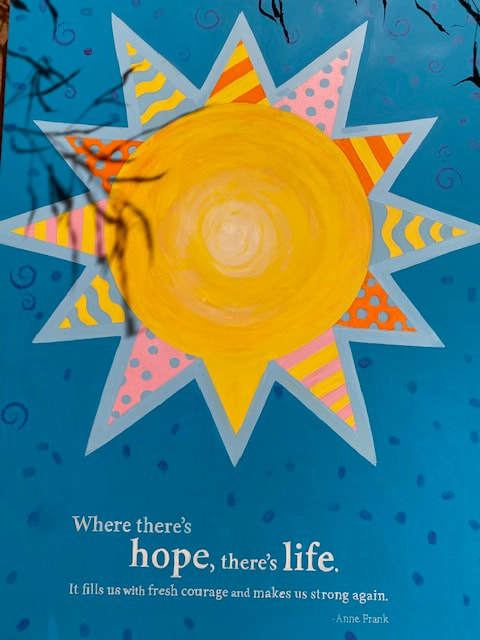
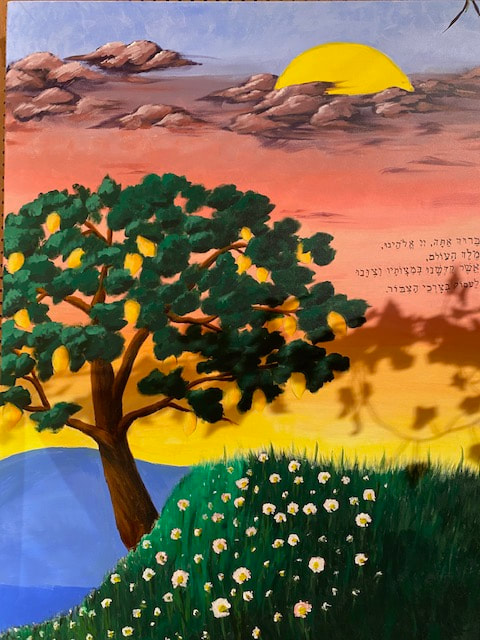
 RSS Feed
RSS Feed